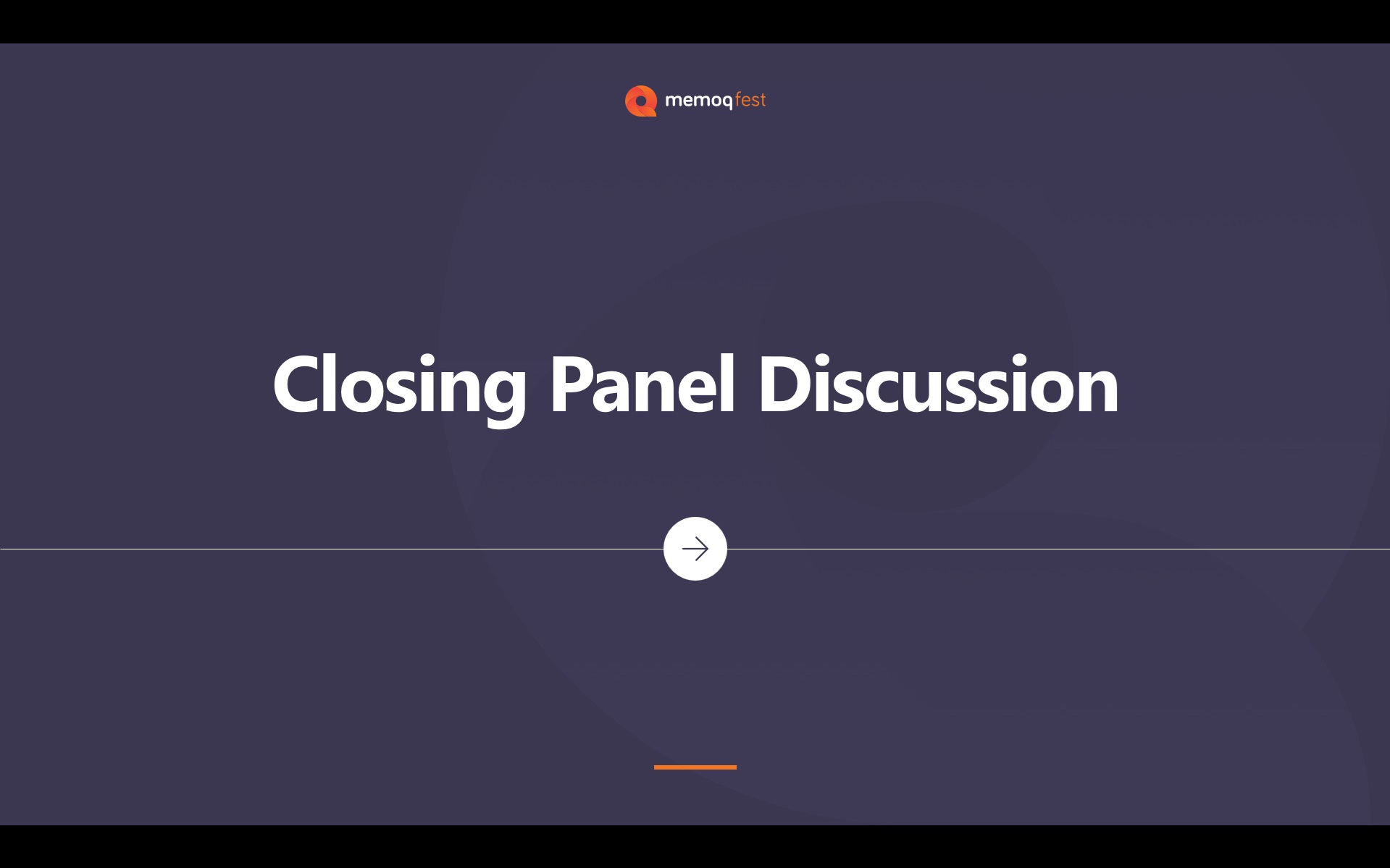Conference Program 2025
Welcome to memoQfest 2025
memoQ Progress Report
memoQ co-CEO, Peter Reynolds, will give a progress report on memoQ’s activities over the last year.
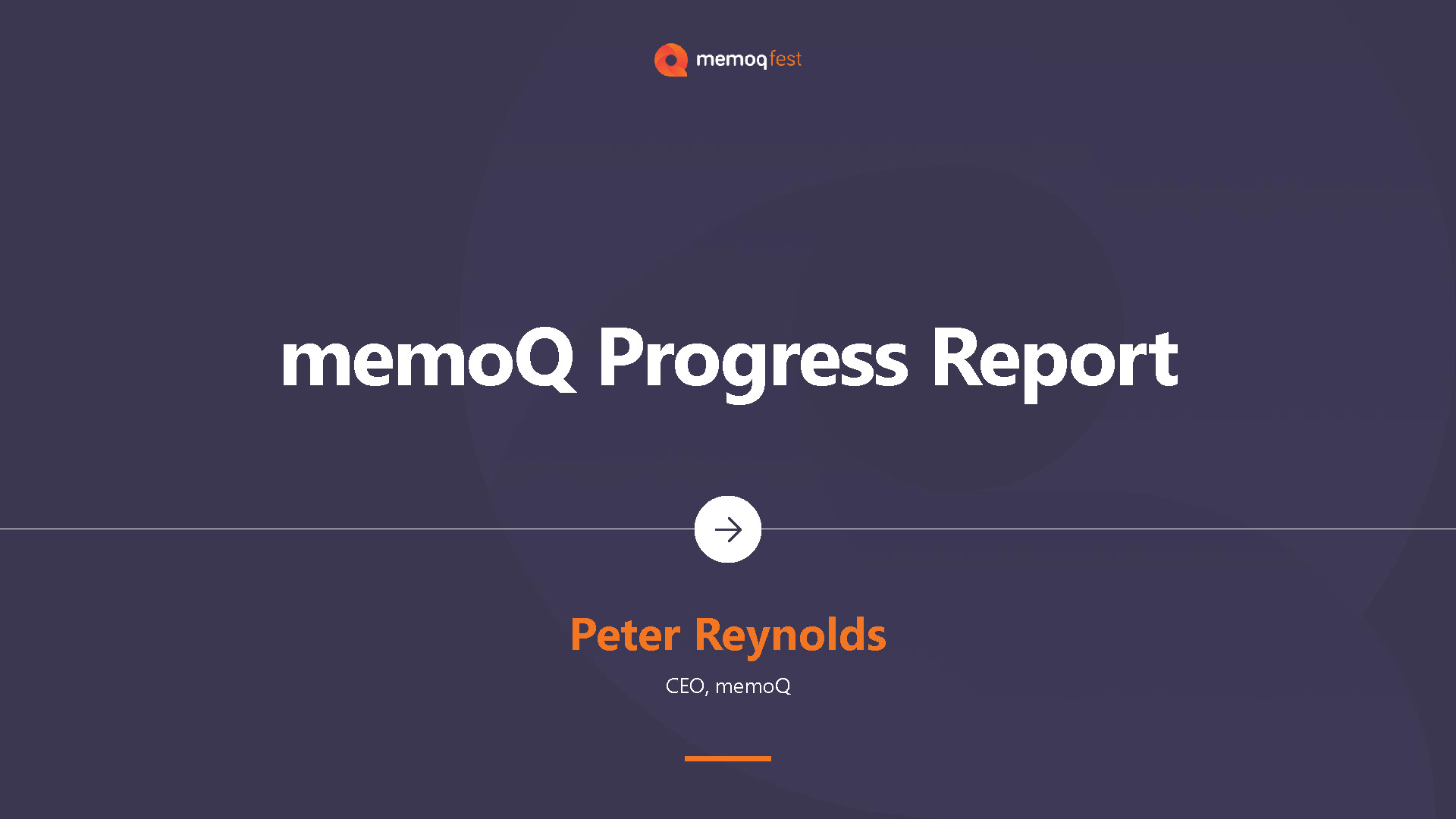

Keynote Session: The Future is Now!
This presentation is about how two companies are working to use technologies such as AI to provide their customers with greater value. Microsoft is the company which provides the platform for most other companies to do business. memoQ is a company that builds on this platform. This presentation which takes place as we launch memoQ on Azure marketplace will feature Justin Alderson, Managed ISV Lead at Microsoft, and Balázs Kis, Founder and Chief Evangelist at memoQ, discussing how these companies are responding to the challenge to provide their customers with the tools to help them grow their businesses.
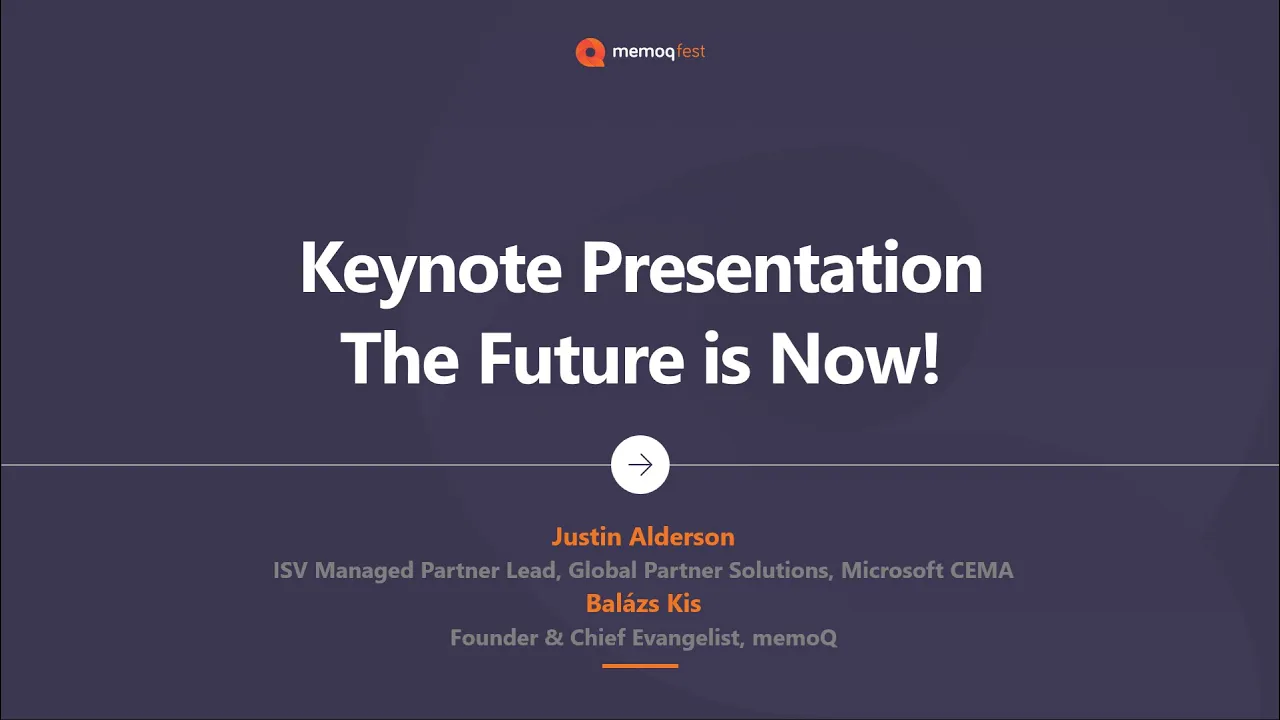

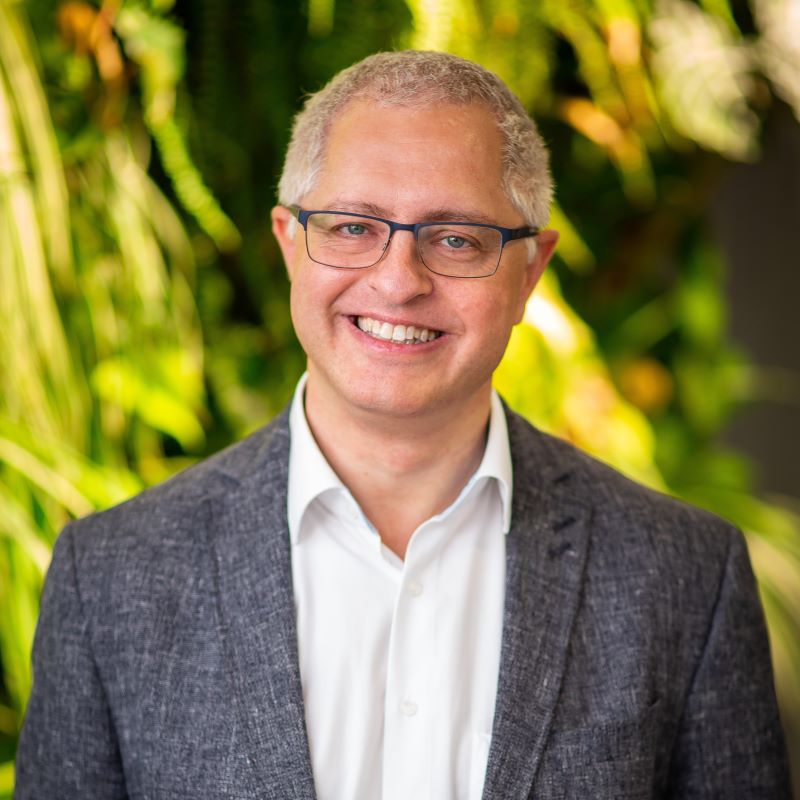
Coffee Break
memoQ AGT or globalese by memoQ – Which is the right choice for you?
memoQ offers cutting-edge AI-powered MT solutions you absolutely want to include in your localization workflow. But which one is best for you: memoQ AGT or globalese by memoQ?
Join us to discover which of these two powerful solutions best fits your needs. Our AI experts will be presenting their respective strengths so you can better understand their added value in your process.
You don’t want to miss out!
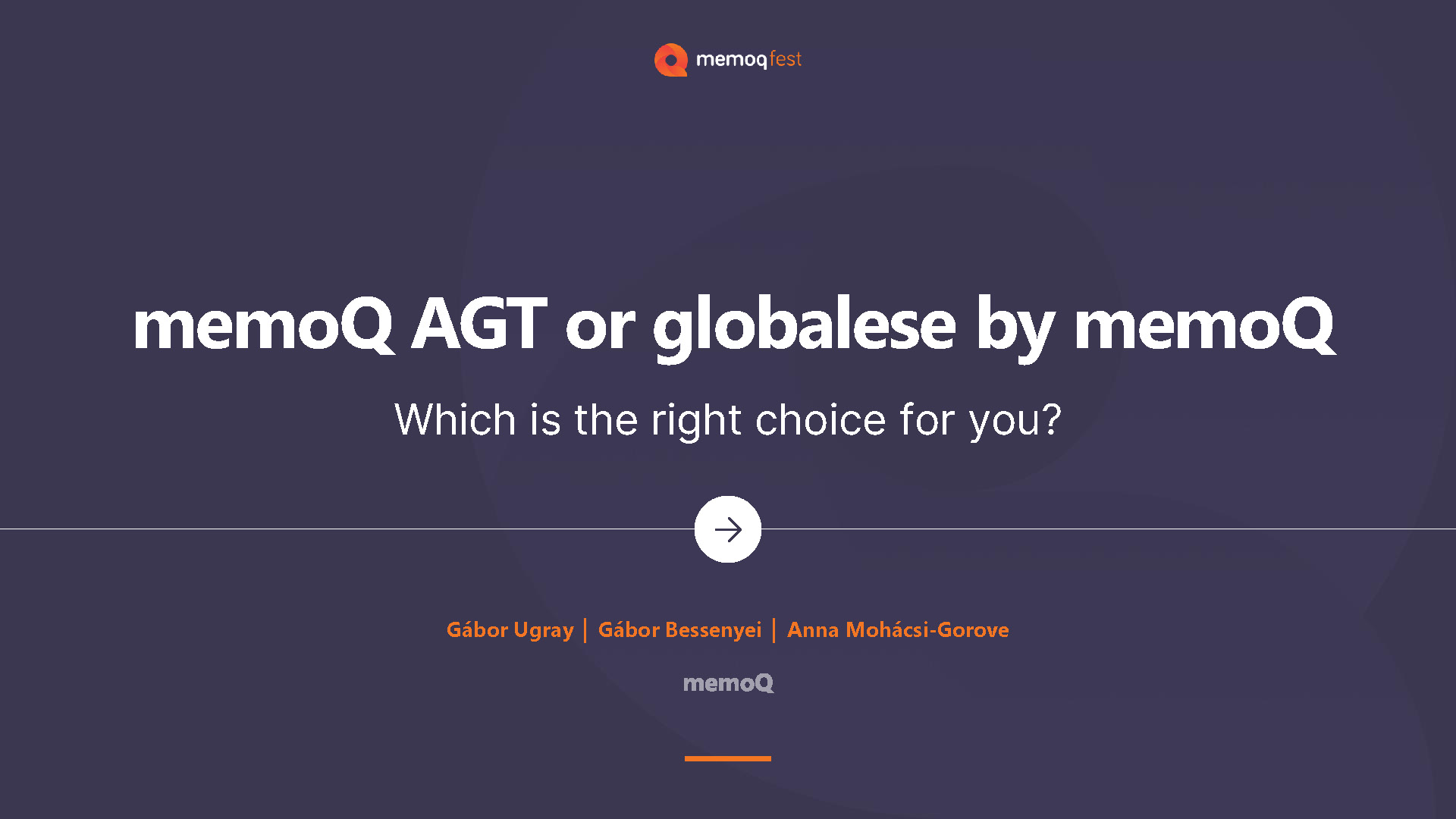
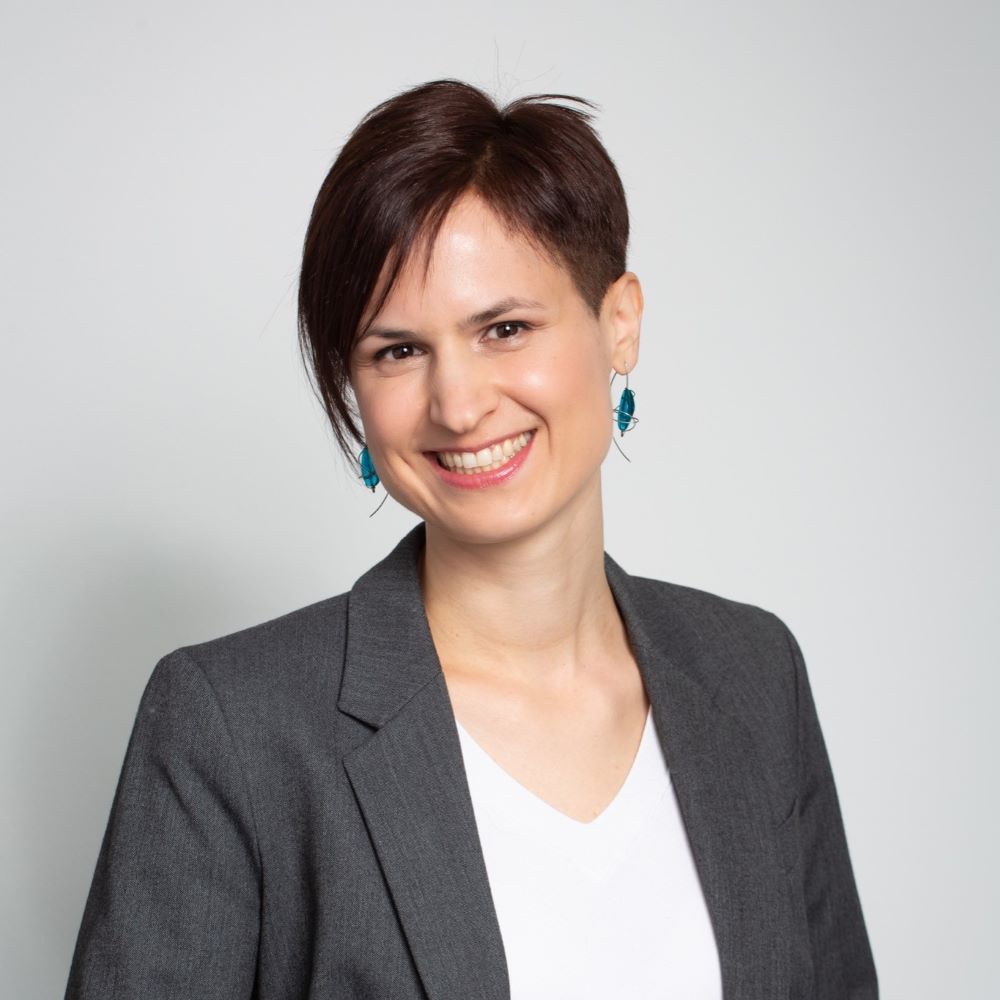

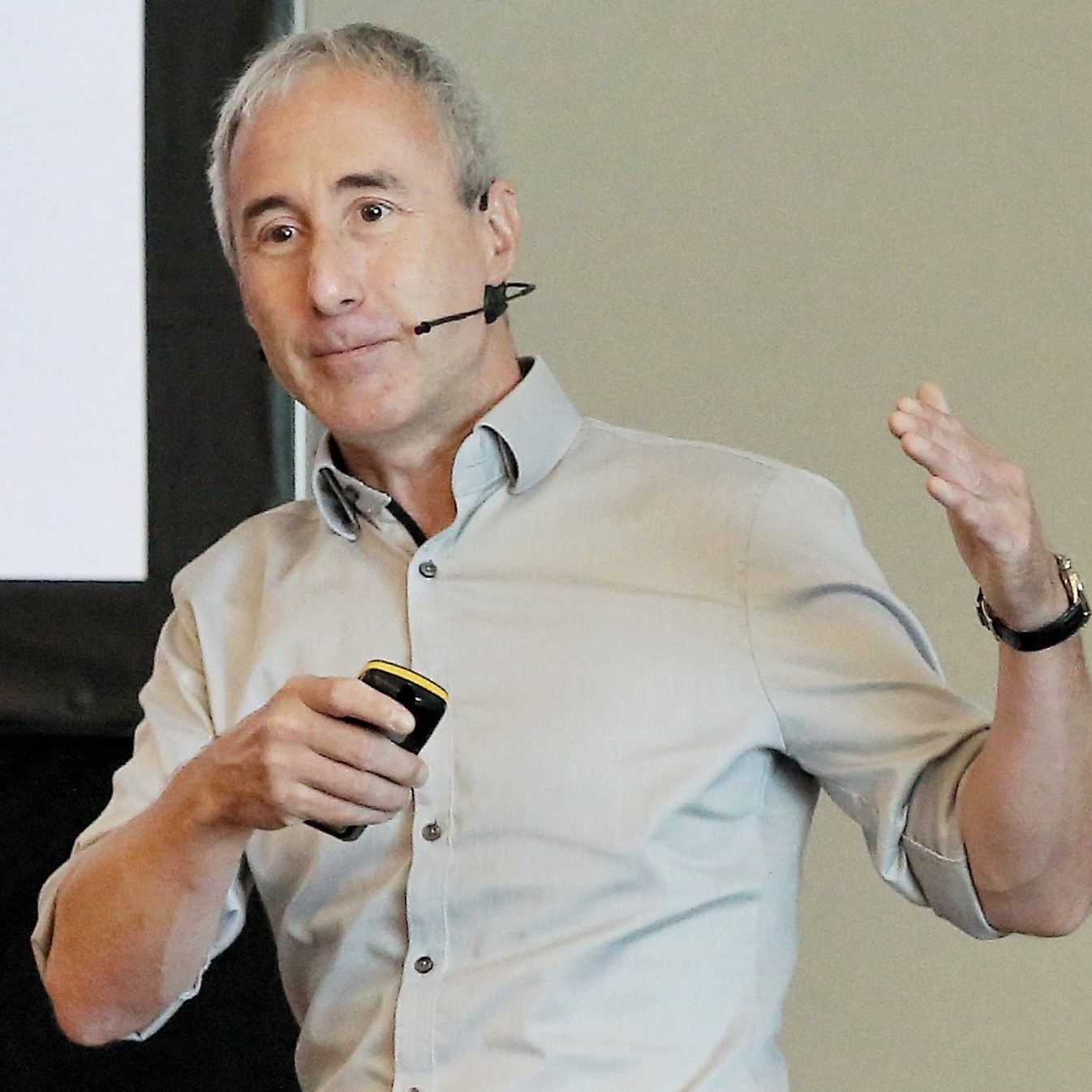
Integration Showcase: It’s a Match! FlowFit & memoQ Swiped Right for Seamless Workflows
Some matches are just meant to be. Join us as we take you behind the scenes of the most complete and intuitive integration between a TBMS and a TMS on the market today: FlowFit and memoQ. From first sync to full commitment, this duo has evolved into a fully bidirectional powerhouse that covers every step of your translation and localization processes. Whether you’re managing complex enterprise workflows or high-volume multilingual projects, you’ll see how FlowFit and memoQ now work in total harmony, so your teams don’t have to juggle, duplicate, or compromise. Come discover what it really looks like when two systems just click.

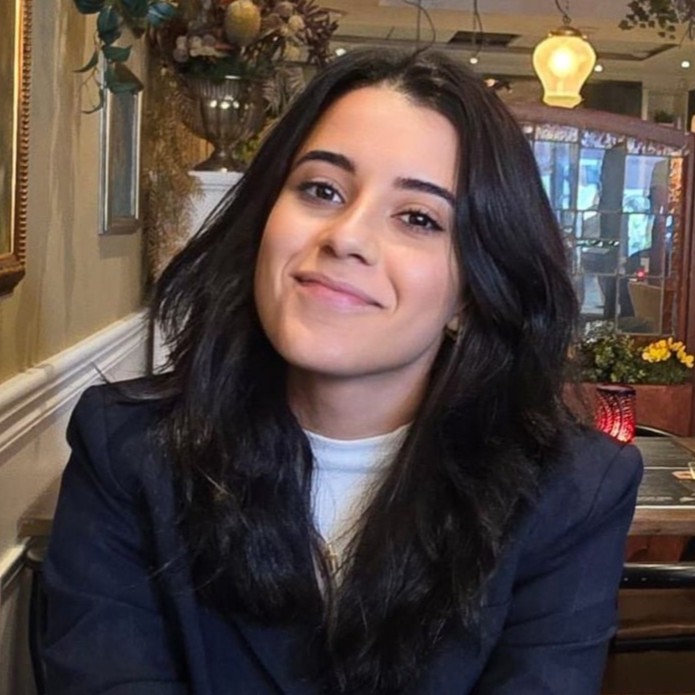
AI as a reviewer
At Alpha we have built a custom AI to act as a reviewer. It is trained to comply with ISO specifications for LQA (ISO 5060) and provide feedback on segments that are deemed less than perfect. It is integrated in the server based workflow, so when a translator delivers a file, it is sent to the AI for review, and then automatically reimported with the comments, and segments that are commented have changed status to Edited, so they are easy to filter. The translator can read the comments in the preview/comments pane and either disagree and reconfirm the segment as it is, or implement the suggested changes or make other changes. It is not designed to replace a human reviewer, but to provide feedback in workflows where there isn’t one, and can also be deployed to assess MT.
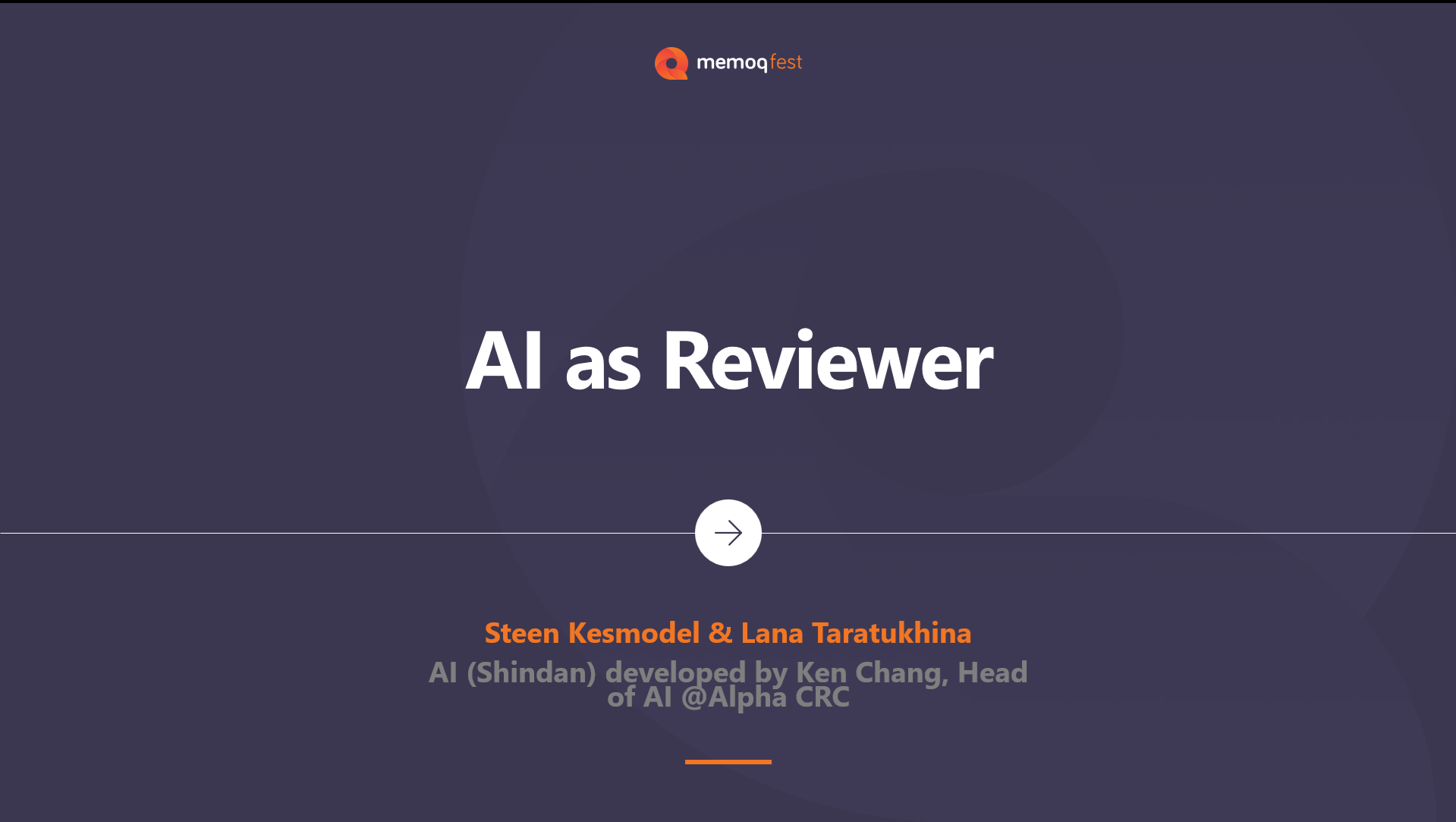

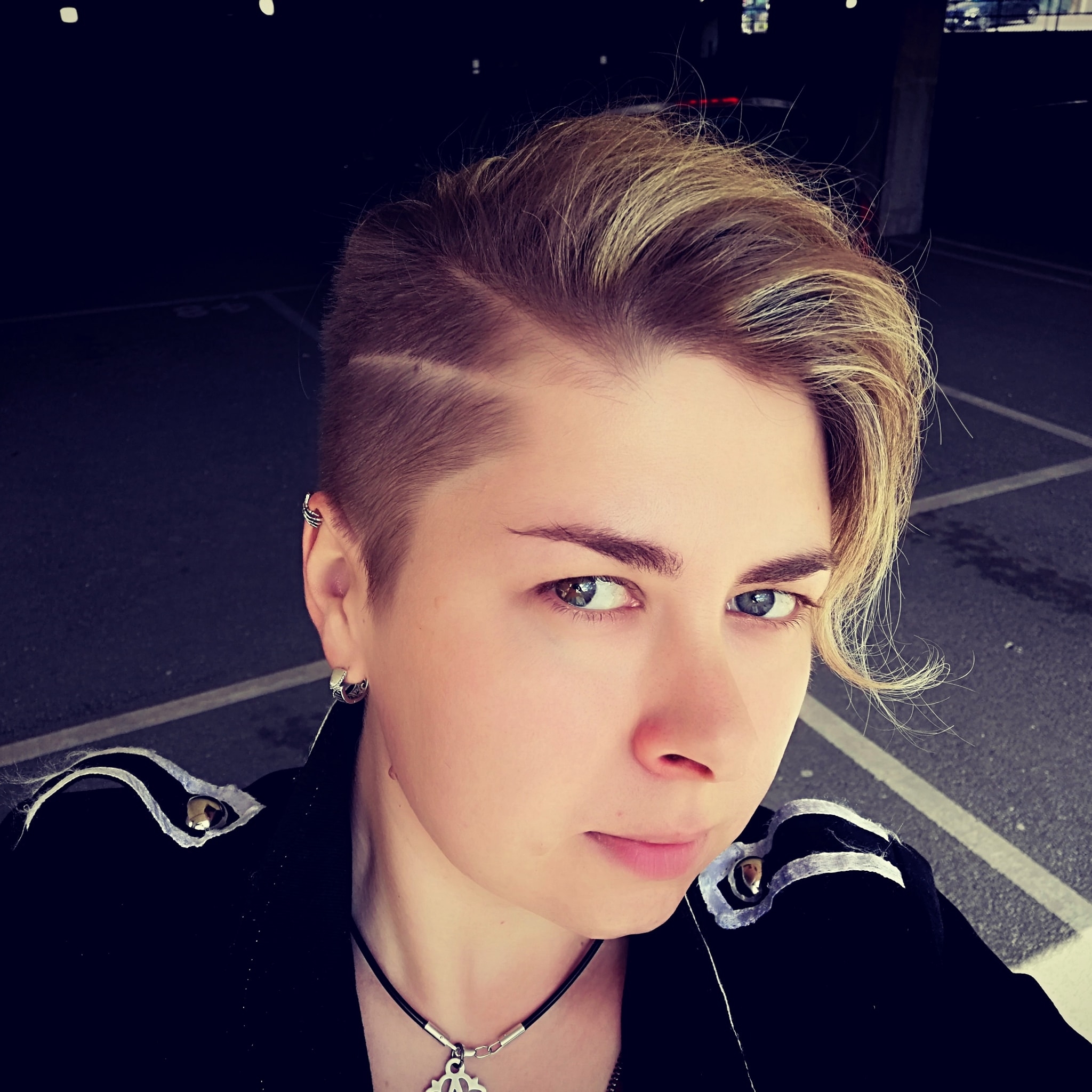
Beyond the Data: The Rise of Requirements-Driven Localization
Most localisation programs at global companies are data-driven with the aim of maximizing their Machine Translation so their linguists or LSPs can post-edit quicker – but with the tools available to us in 2025, shouldn’t we be aiming higher?
If we start focusing on the requirements that need to be met, and not just the data that we have, then we can get much closer to full automation – previously seen as just a dream.
In this session, Sergei Polikarpov, will explain how Intento’s Language Hub, and its integration with memoQ, is designed to configure multi-agent translation workflows that can operate fully automatically to meet all of your business and language requirements. Sergei will share Intento’s current approach and how global customers are already taking steps towards a fully automatic program, by using a requirements-driven approach.
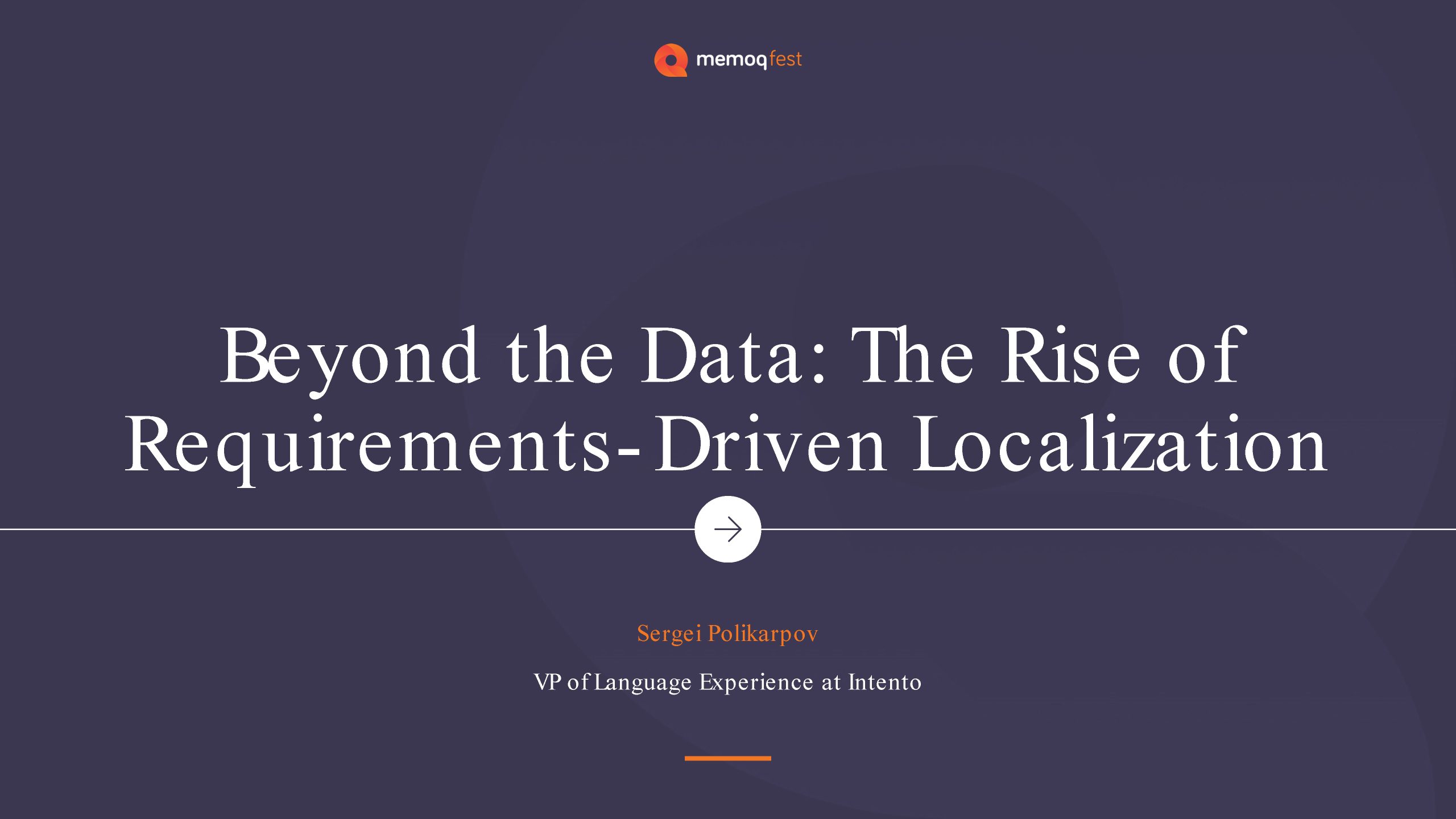

Beyond segment-based MT: Achieving context-aware localization with memoQ
Machine translation engines and LLMs have reached a level where serious translation mistakes are rarely due to flaws in the technology itself but rather to how they are applied. In fact, many of the most critical errors today arise from a lack of contextual awareness, where translations fail to maintain consistency, coherence, and accuracy across segments.
Yet not a single MT plugin currently available in memoQ, including memoQ’s own AGT, enables context-aware translation—all still translate one segment at a time in complete isolation—an astonishing limitation that leads to inconsistencies, mistranslations, and avoidable errors.
To address this, we enhanced our customizable GPT-powered solution, PromptLoc, first introduced at last year’s memoQfest, adding functionality specifically designed to overcome segment-based constraints. The improved system allows multiple segments to be translated simultaneously while retaining segmentation, and, in addition to processing batches of segments at a time, it also allows users to customize memory length (i.e. how many previous source segments and their translations are retained), ensuring that context is maintained not only across segments but also across batches.
It also integrates seamlessly with memoQ’s Resources API, automatically enriching each translation batch with relevant TM and TB matches. Additionally, users retain complete flexibility to customize prompts to suit diverse project requirements.
We’ve successfully adopted this approach internally at Edimart for MTPE and raw MT tasks, greatly improving our localization workflow and translation quality. In this talk, I will share practical insights from our experience, explain the technical aspects behind this solution, and demonstrate how this new approach can benefit other memoQ users facing similar challenges.
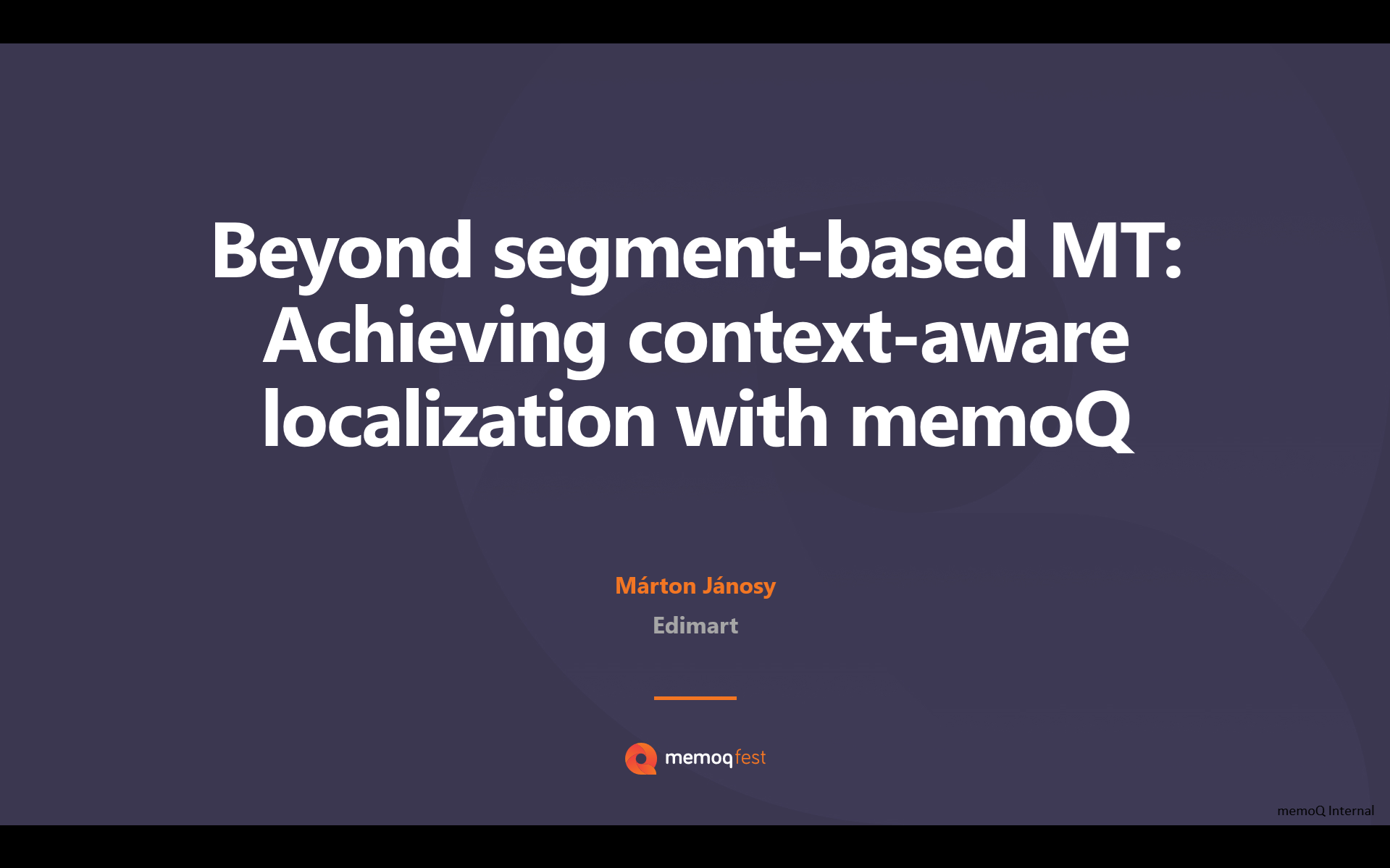

Integration Showcase: Customization and Automation in UNICORN A-M-P
Presentations delivered by technology partners like Plunet, Consoltec, Intento, Unicorn A-M-P, Juremy and others on their integration with memoQ. The order of presentations will be confirmed until May 6.
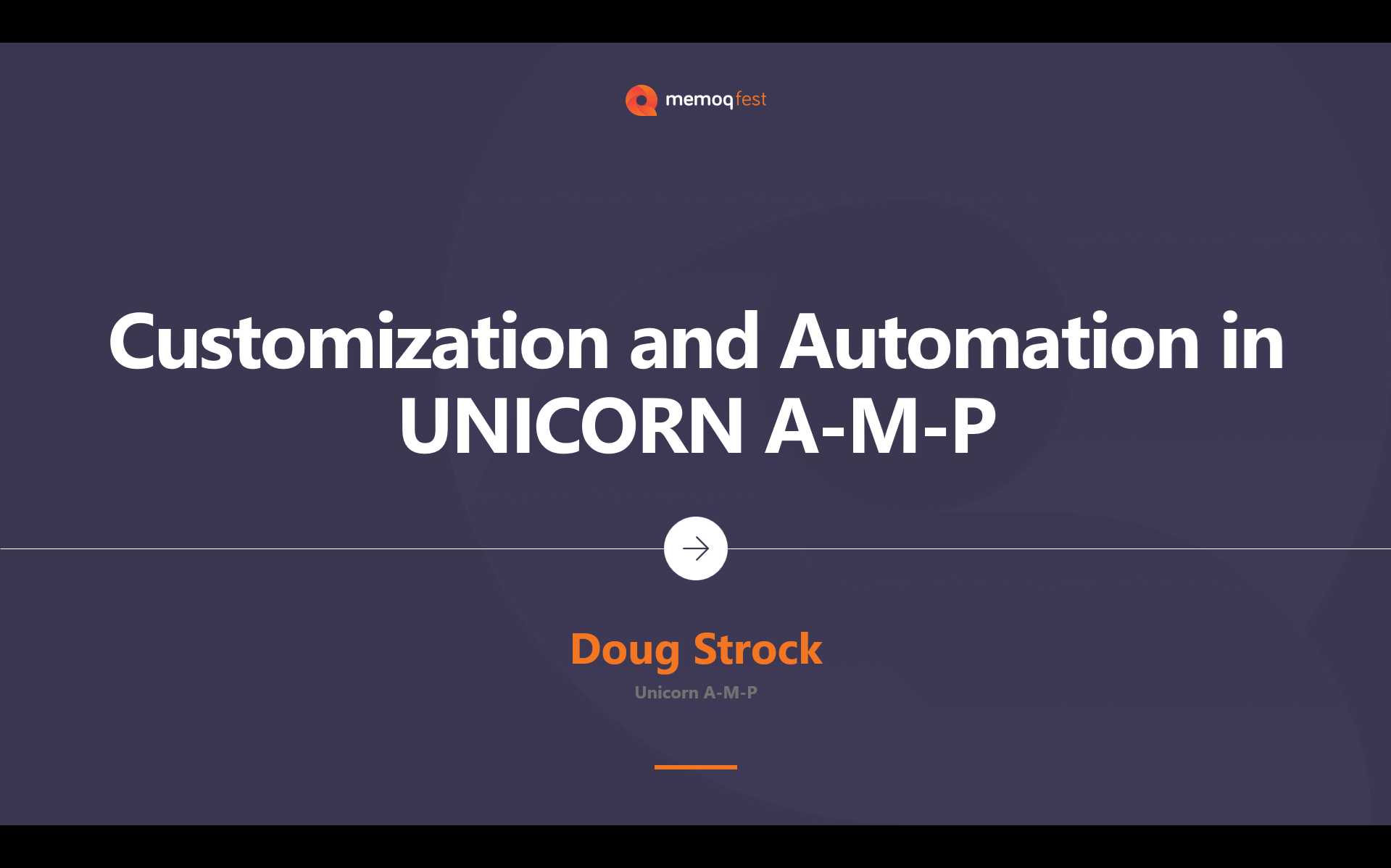
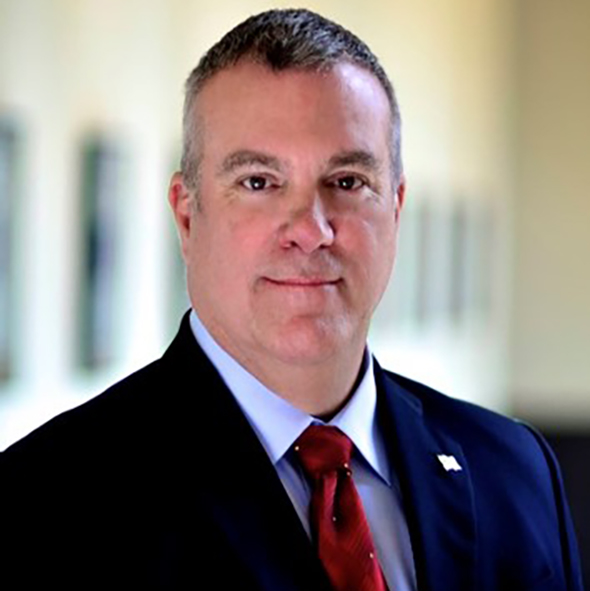
Speed training with memoQ training services
This year, we want to put our Training Hub in the spotlight and to give you a chance to meet them and find out how they can support your business.
You already have a burning question and would like to meet with our Training Hub? You can book a Speed Training slot right now using one of the following links:
We look forward to seeing you soon!


Open hour with memoQ business services
This year, we want to put our Business Services Hub in the spotlight and to give you a chance to meet them and find out how they can support your business.
You want to automate more aspects of your workflow and are seeking advice on how to connect to other systems? Come meet with our Solution Architects and Solution Engineers at the registration desk during our open hours on Thursday and Friday afternoon.
We look forward to seeing you soon!

Group Photo | Lunch & Networking
memoQ master class: A deep dive into memoQ AGT & globalese by memoQ
Come join our very own memoQ people as they deep dive into both our AI-powered translation automation technologies, memoQ AGT and globalese by memoQ.
Firstly, Ádám Gaugecz and Inès Berbudeau will tell you everything you need to know about memoQ AGT: from API creation and character usage monitoring to configuration and hands-on use, they will share with you best practices and great insights on memoQ AGT.
Secondly, Gábor Bessenyei and Anna Mohácsi-Gorove will present you the in-and-outs of globalese by memoQ and how this solution can empower your organization to easily create high-quality translation engines tailored to your specific needs.
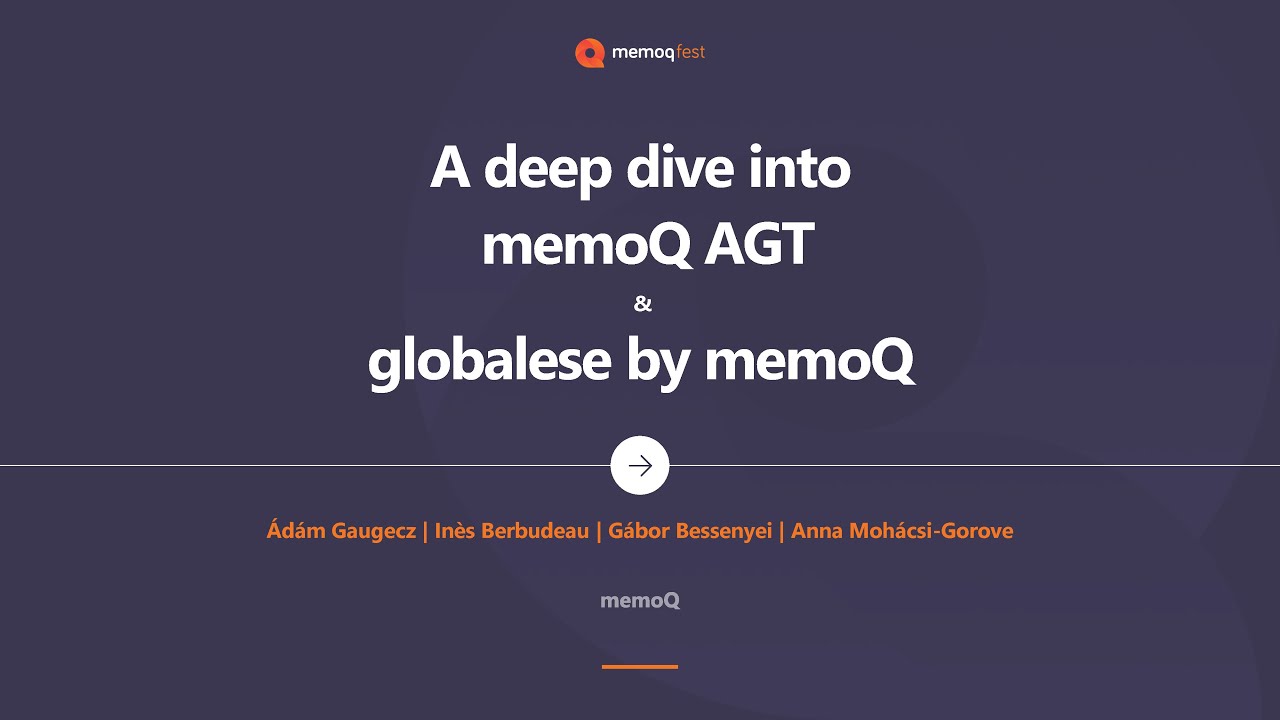




memoQ master class on enhancing information security: Leveraging memoQ TMS effectively
Information security in memoQ TMS is everyone’s responsibility! This master class delivers practical techniques for all users. Learn core security concepts and how to apply them using memoQ’s features to enhance user management, project security, and resource protection. We’ll focus on simple yet effective strategies to protect your data, meet client requirements, and confidently address security questions.
Target audience: project managers and administrators of memoQ TMS
Level of knowledge required: intermediate/advanced.
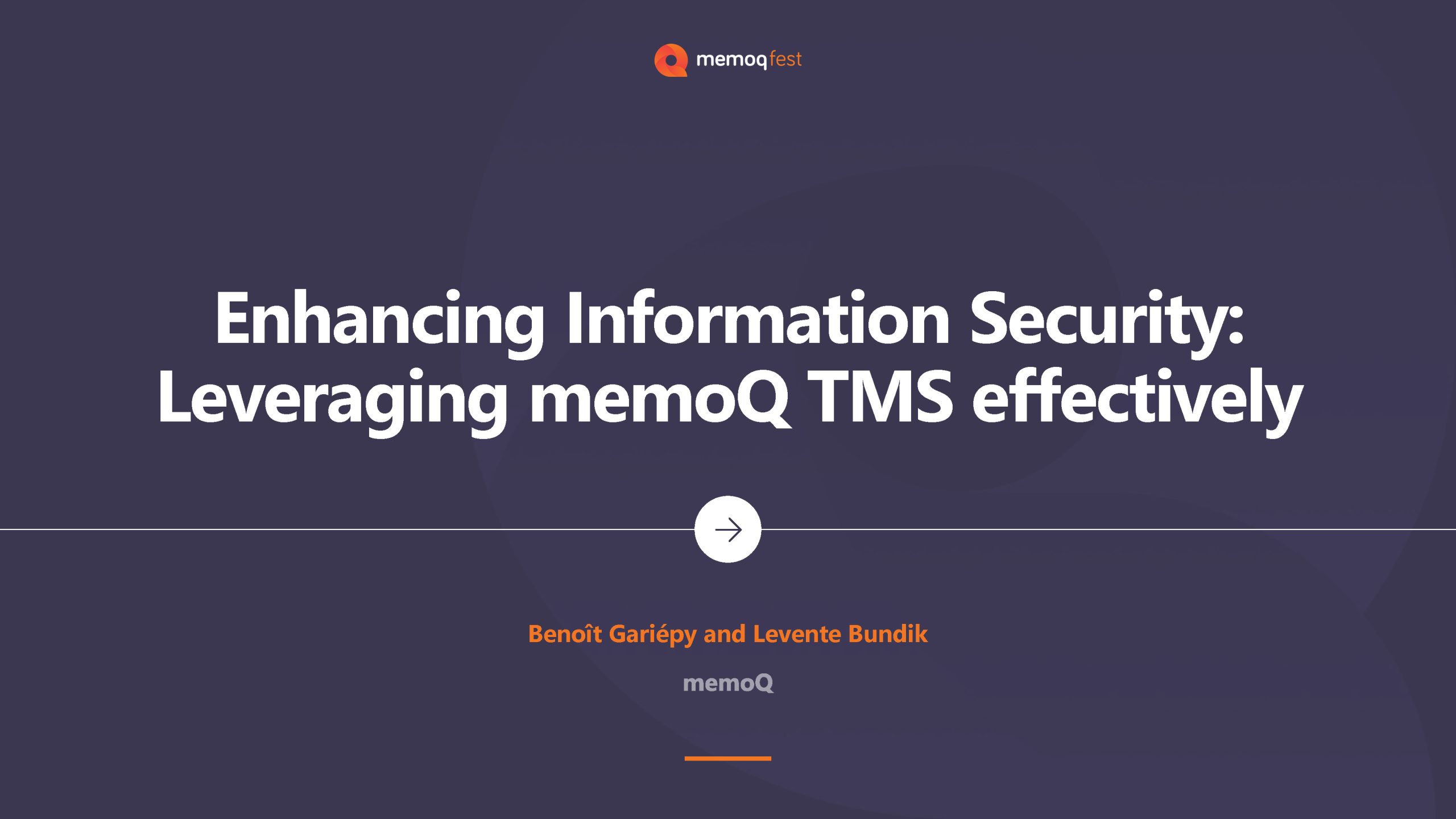


memoQ master class: Regex your QA
The memoQ QA check contains a lot of useful checks, but there might be more things you want to do.
Using auto-translation rules and activating them for the QA check can already catch some of them, like making sure that there is a non-breaking space between a number and a measurement. But even that might not be enough, because there might not be any element in the source to compare the target to.
Here the QA check can look at the target language only, for example catching any half-width katakana characters in a translation into Japanese or making sure the currency symbol is in the right place or the date formats are consistent…

memoQ master class for language engineers & power users (Part III)
The master classes on TMS/server optimization at the memoQfest 2023 & 2024 provided a good opportunity for advanced server users to meet and discuss various performance issues with memoQ’s developers.
The goal of this session would be to follow up on the issues discussed last year and provide a forum for server managers to share insights and discuss persistent challenges with the developers.

Coffee Break
AI-Terminator: Augmenting human terminology management with neural networks - a case study with Human-AI collaboration
In the era of neural machine translation, maintaining consistent terminology remains a crucial challenge. AI-TermInator demonstrates how artificial intelligence can enhance, rather than replace, human terminology work. This presentation showcases a novel term extraction tool that combines AI’s capabilities with human expertise through domain-specific extraction, smart filtering, and context-aware processing. Unlike traditional statistical extractors, AI-TermInator understands context and validates terms through multi-step verification, while respecting human-curated exclusion lists and existing terminology. We’ll demonstrate live examples of how translation teams can reduce terminology extraction time while maintaining high quality through this human-AI collaboration approach.
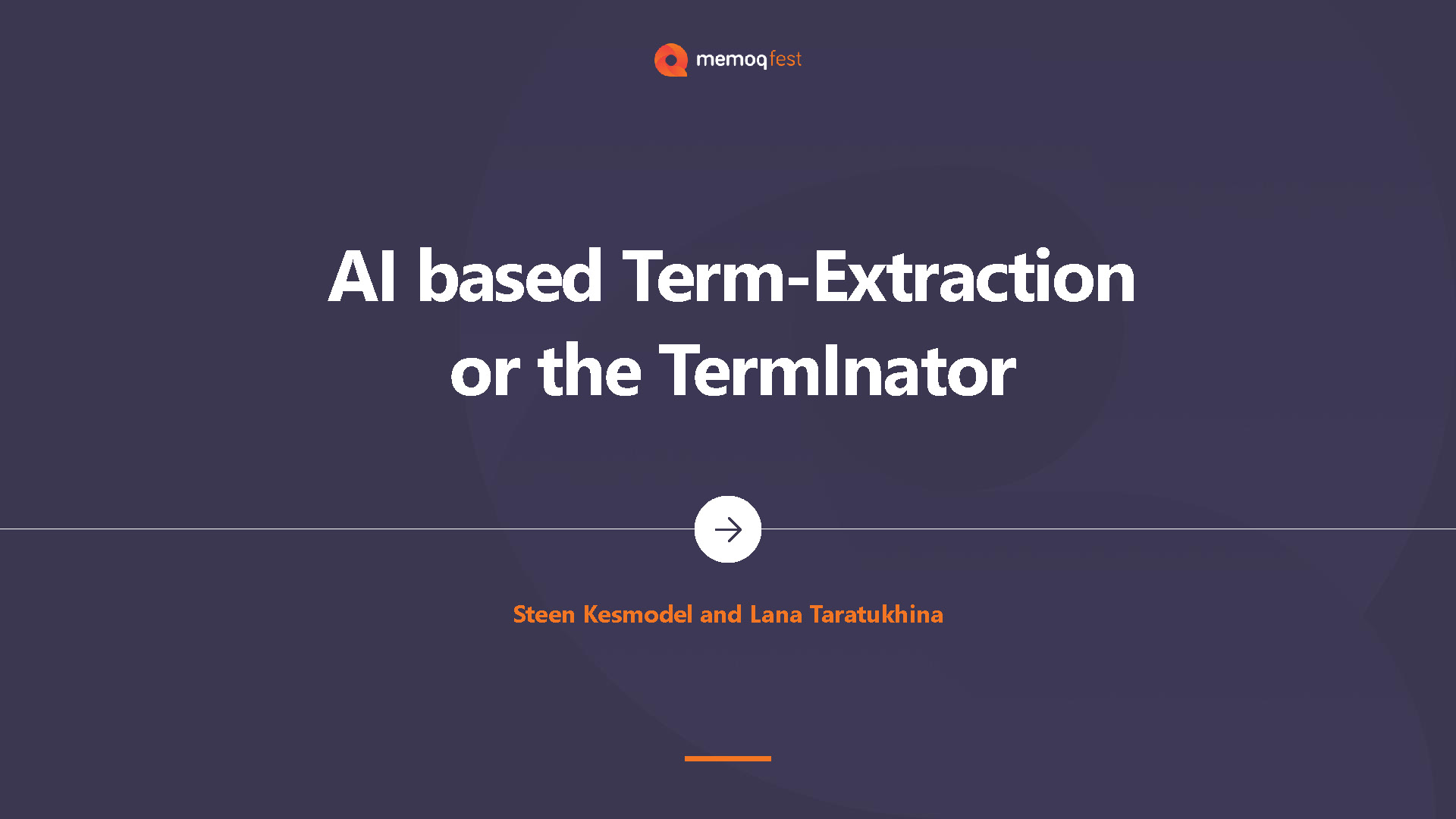


AI-Powered slug conversion: Enhancing translation workflows with memoQ and ChatGPT
In translation projects, handling URL slugs presents unique challenges due to specific formatting rules that differ from standard text translation. In this case study, we explore how we were able to exploit various memoQ functions and AI-driven automation to optimise our workflow for a website localization project involving six languages. After a first trial with traditional pre-translation and regex-based processing that proved inefficient, we decided to leverage ChatGPT to automate slug conversion. This approach drastically reduced manual effort while ensuring linguistic accuracy. The final review by human linguists confirmed the effectiveness of AI-driven processing. This presentation showcases how AI can enhance translation efficiency and reduce translation costs while maintaining human expertise at the core of quality control.
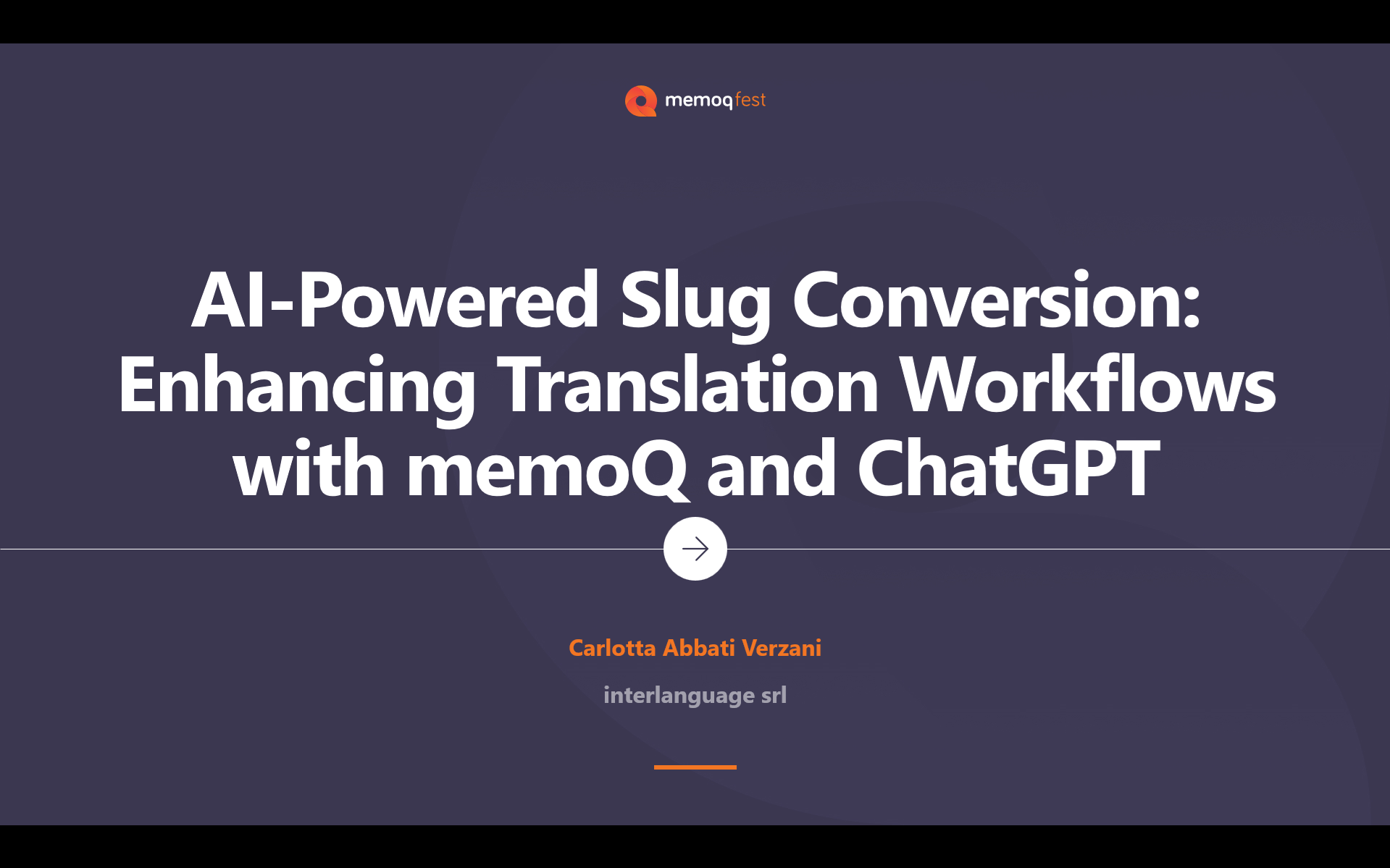
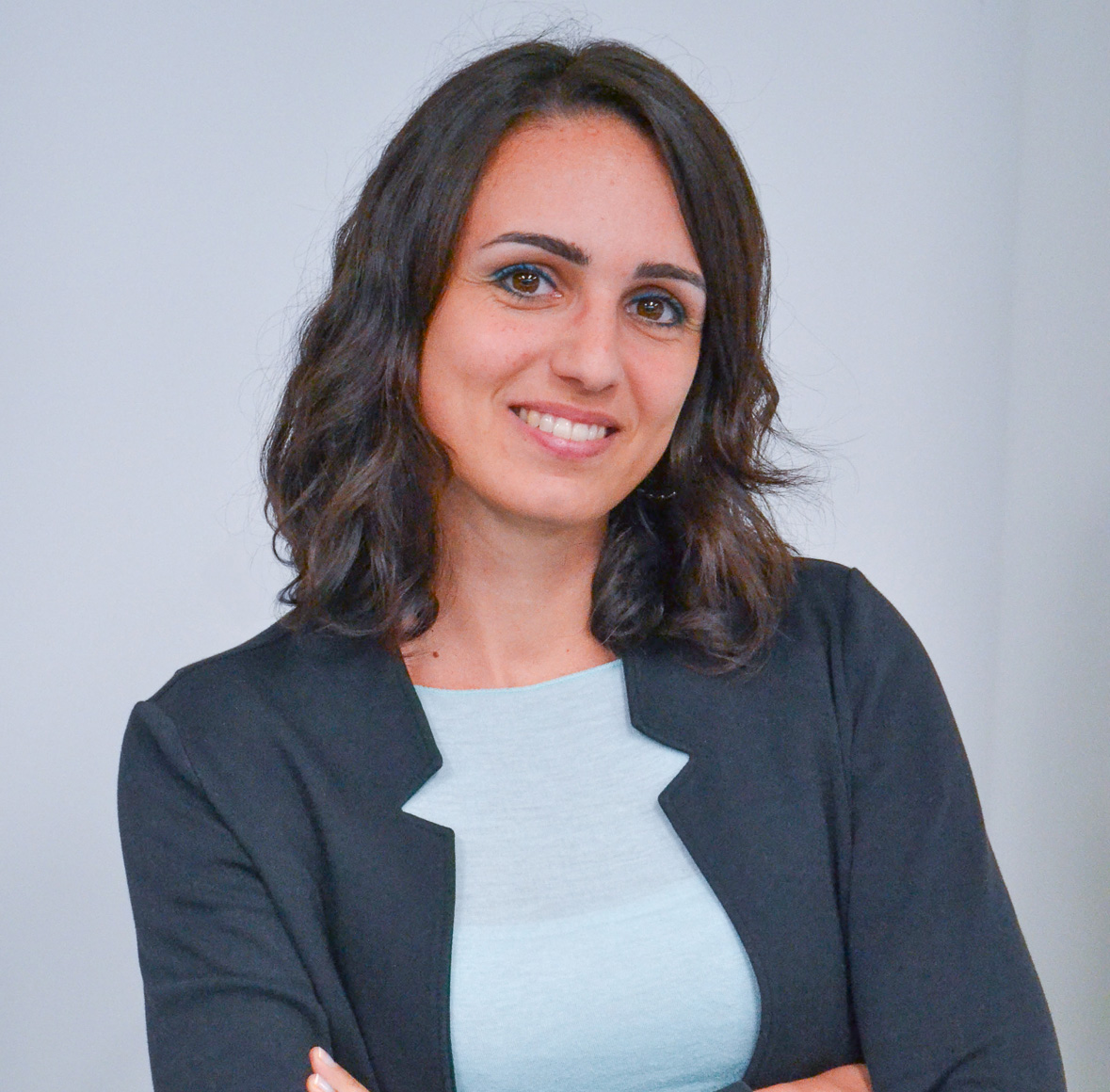
Speed training with memoQ training services
This year, we want to put our Training Hub in the spotlight and to give you a chance to meet them and find out how they can support your business.
You already have a burning question and would like to meet with our Training Hub? You can book a Speed Training slot right now using one of the following links:
We look forward to seeing you soon!


Open hour with memoQ business services
This year, we want to put our Business Services Hub in the spotlight and to give you a chance to meet them and find out how they can support your business.
You want to automate more aspects of your workflow and are seeking advice on how to connect to other systems? Come meet with our Solution Architects and Solution Engineers at the registration desk during our open hours on Thursday and Friday afternoon.
We look forward to seeing you soon!

Backstage tour with the production team & panel discussion
Let the production team guide you through the most recent developments, and get a glimpse of what’s cooking at memoQ right now.
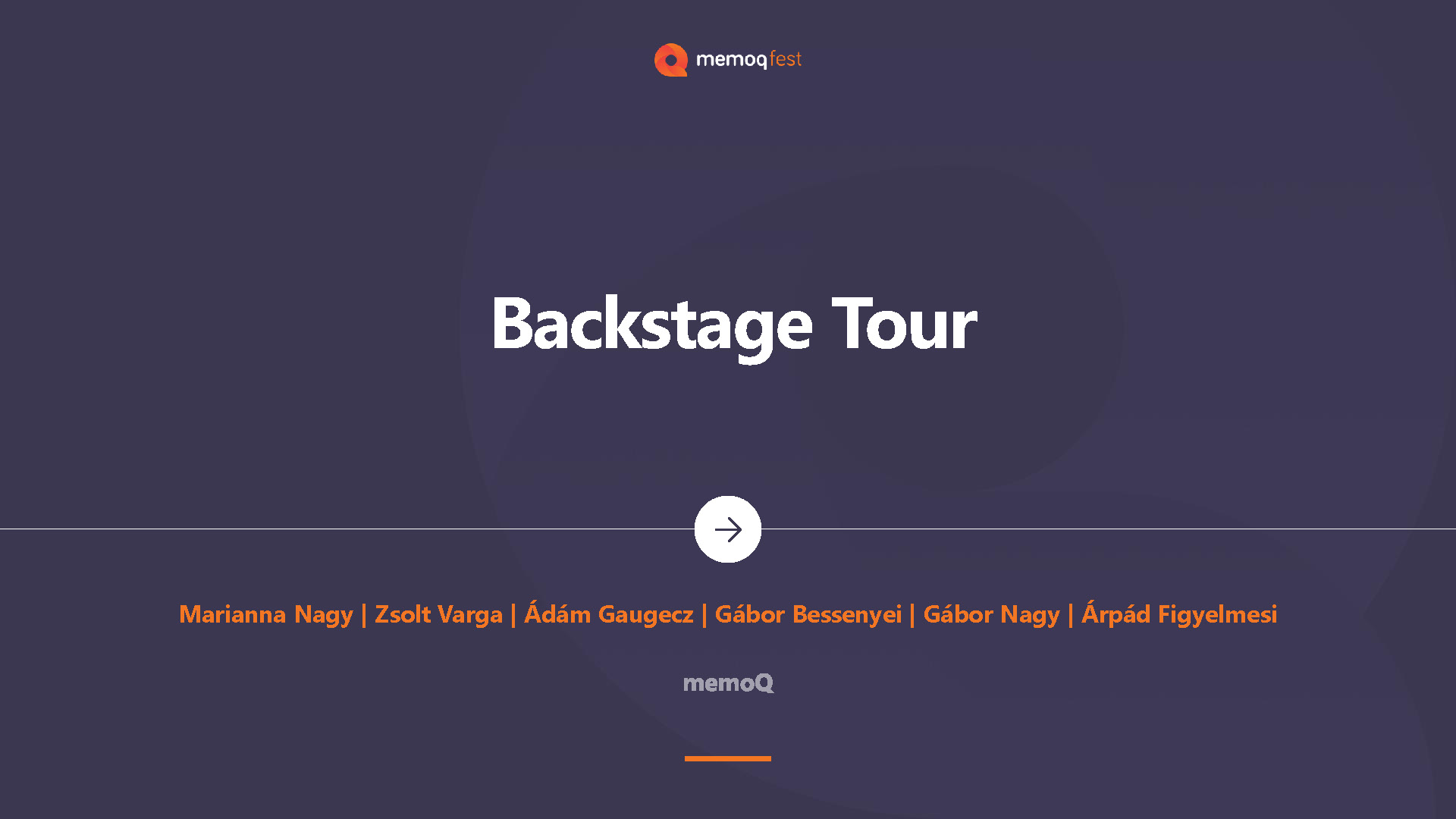







Gala Dinner
Dizzy, fuzzy or hungover - we've got your back! How better training and custom solutions can get you on your feet in no time
Knowledge is power and good memoQ training by our Training Hub means practical skills that translate (pun intended) into skillful project management, swift and resourceful translations and reviews with technology working for you and not against you.
Complex file types, manual and laborious workflows, integration needs? Taming technological beasts is also a superpower of the Business Services Team, who will help you make decisions on what and how to pre-process, automate or integrate.
Come and join us to learn more about what and how they’ve been working to help customers successfully deliver projects and create custom solutions where it matters.
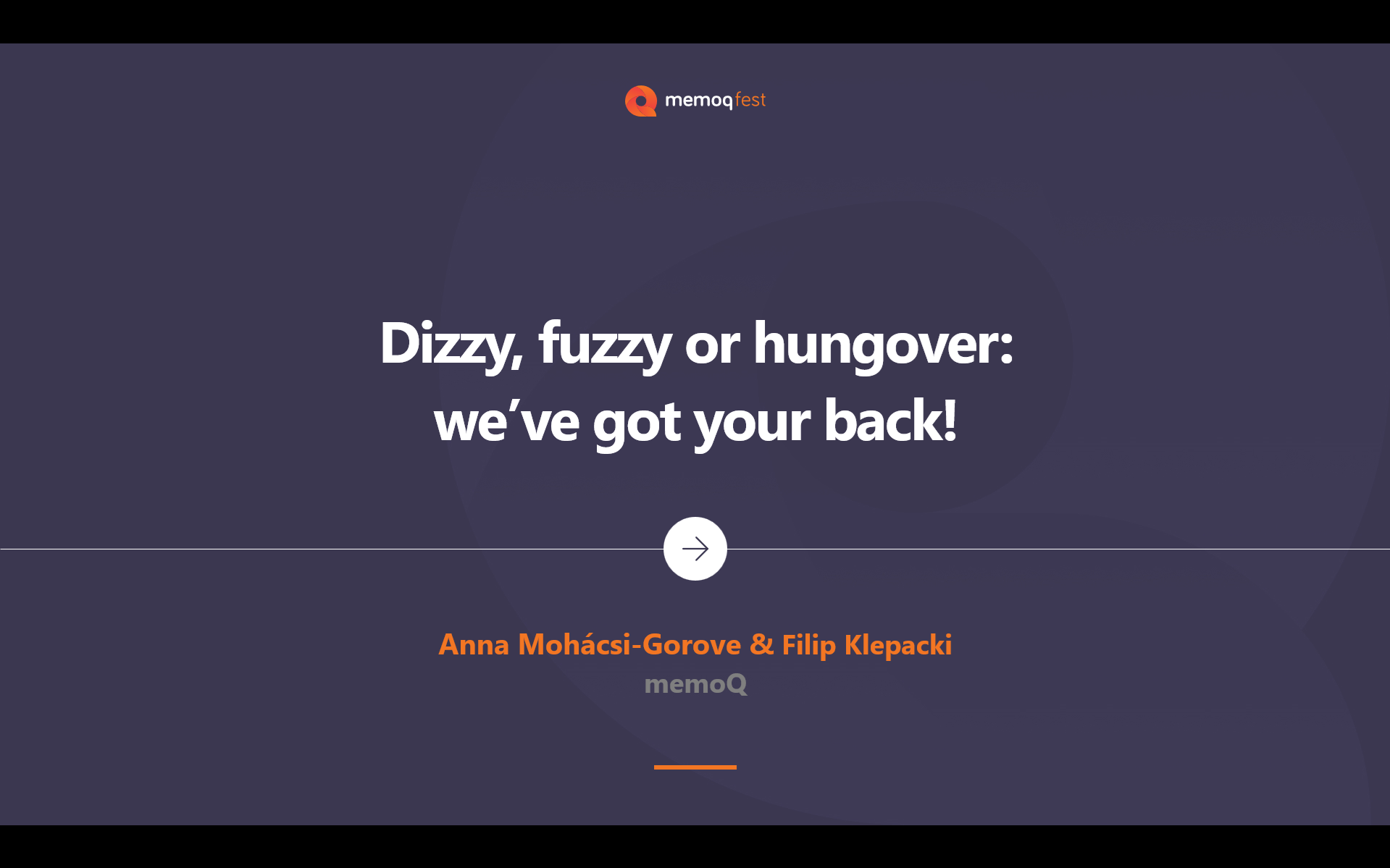



Five ideas for efficiency
Machine translation and Large Language models are now greatly improving the turnaround times for translation, but there many more possibilities within a translation project lifecycle to reduce times even further. Automation of internal process can have a great impact on your Operations teams quality of life, as well as allow you to respond and deliver to customers faster and with less effort.
Building on the success of his 2024 presentation, Ian will present ideas and examples of where you can add efficiencies within your translation workflows, including:
- The efficient mindset
- The API (a quick introduction/reminder)
- Automation in Project Templates
- Filter Configurations
- 1% tools and your AI developer
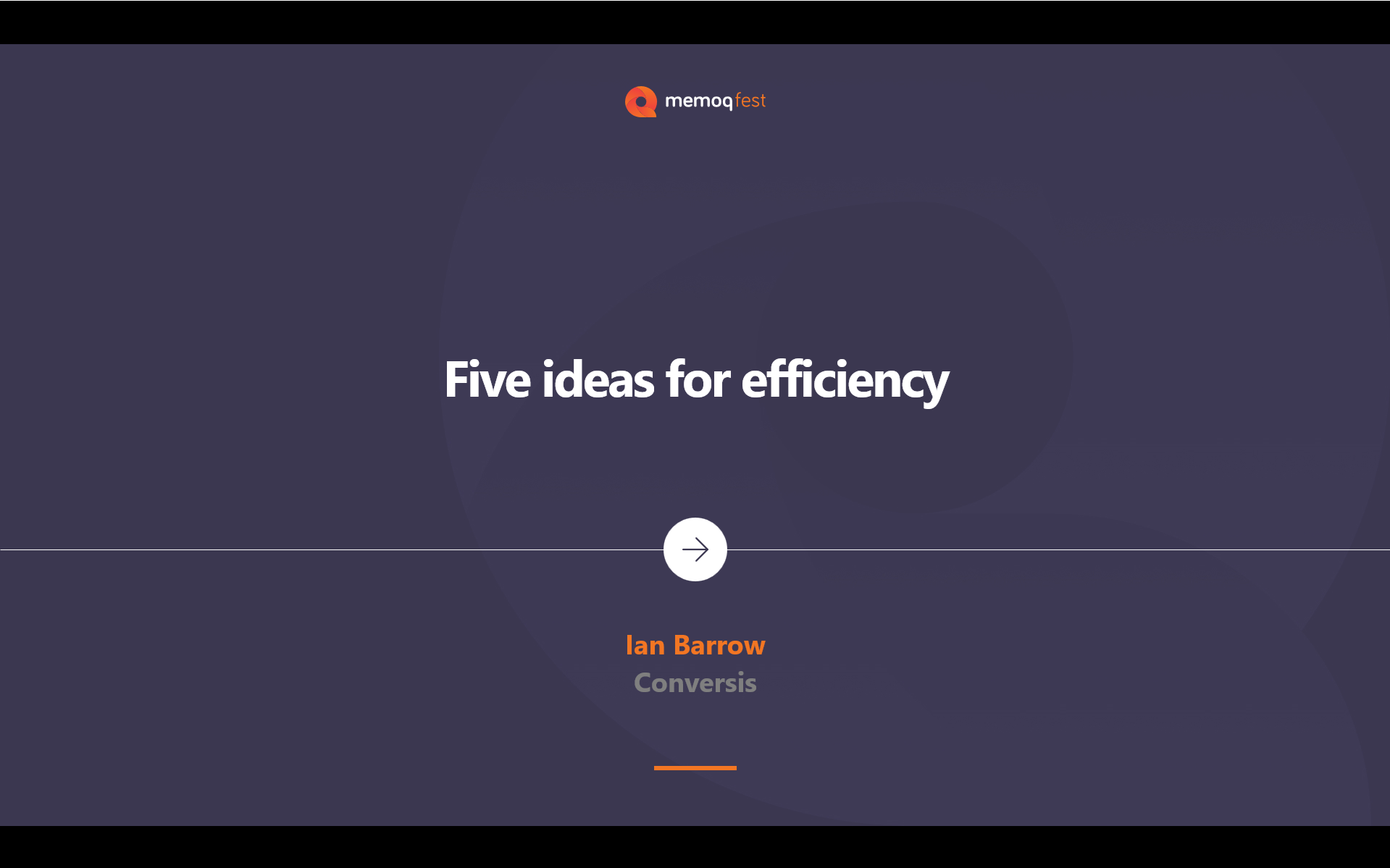
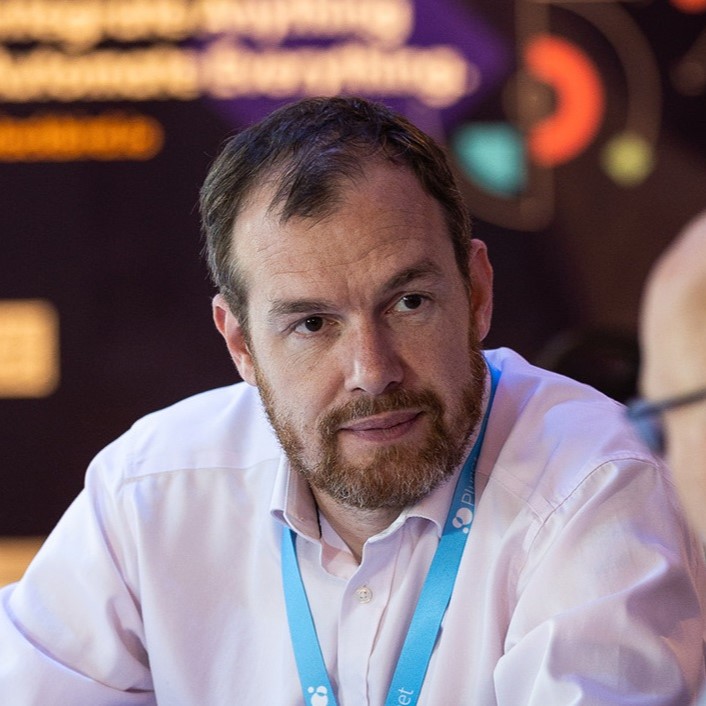
Coffee Break
Speed training with memoQ training services
This year, we want to put our Training Hub in the spotlight and to give you a chance to meet them and find out how they can support your business.
You already have a burning question and would like to meet with our Training Hub? You can book a Speed Training slot right now using one of the following links:
We look forward to seeing you soon!


Inside XLIFF
The XLIFF format is the standard format to transport bilingual data between systems, like translation tools or content management systems. It is a standard format, but allows the creators to incorporate tool-specific information as well. Not all of this information can be used by the receiving tool, however. We will take a closer look at the XLIFF format, what memoQ-specific information an MQXLIFF contains and what to keep in mind when using different tools in the translation process.
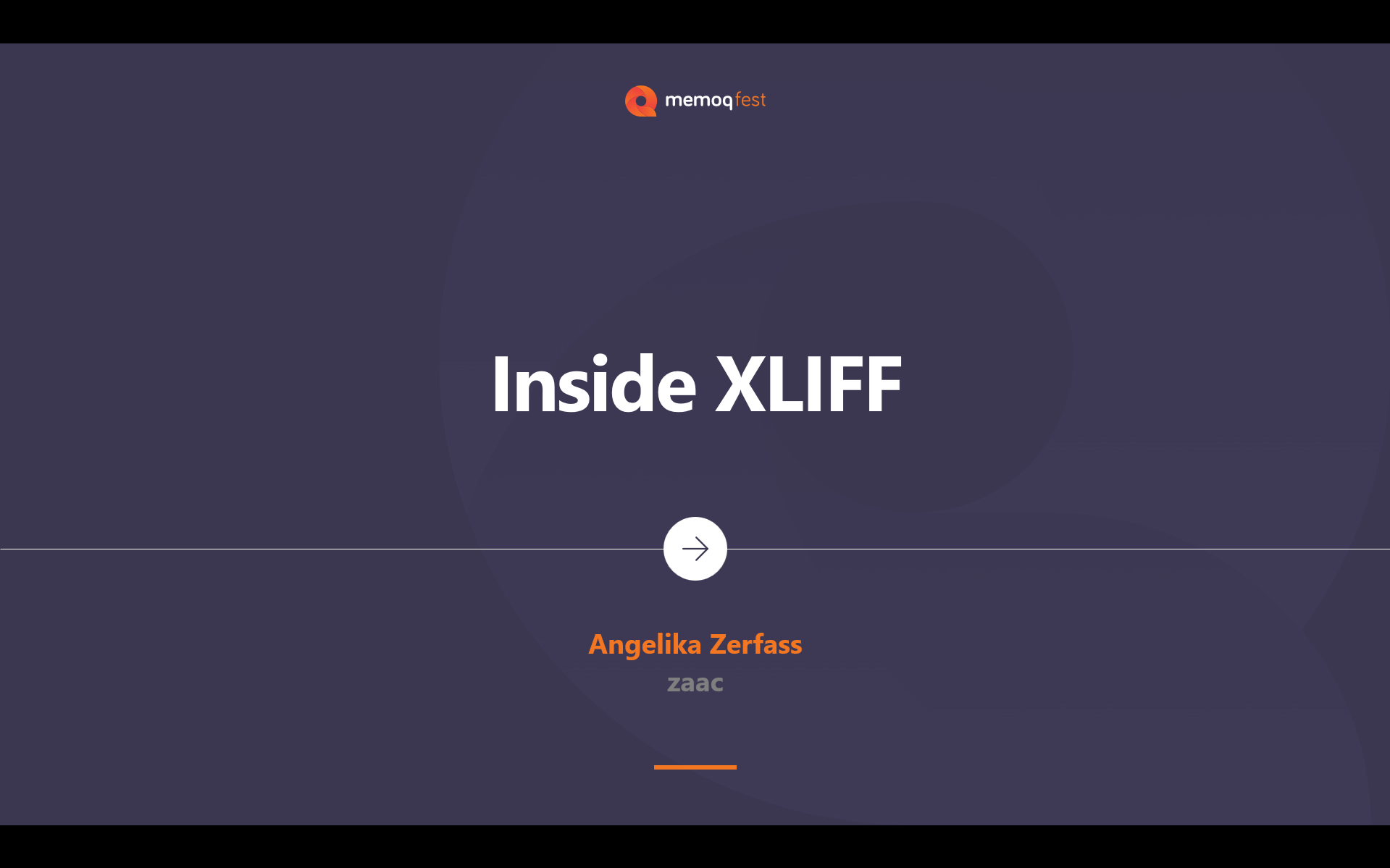

Where accuracy knows no compromise: Instant and verified translation results from trustworthy EU resources by the Juremy-memoQ integration
The ability to swiftly find reliable multilingual references and verify terminology efficiently is increasingly vital to producing high-quality translations.
Particularly in highly regulated domains like legal, pharmaceutical, financial or institutional translations, verification of the AI-output based on reliable databases has become essential.
However, this is often a laborious and time-consuming task: to comply with consistency and accuracy, linguists spend a significant proportion of their time on terminology research.
The creators of Juremy.com designed their online tool to support linguists precisely with this workflow by providing instant and user-friendly search in trusted EU databases. Juremy facilitates the terminology verification process by enabling the use of the EU corpus as a multilingual termbase and translation memory at the same time.
In this presentation, we will demonstrate practical use-cases of the memoQ-Juremy plugin, which provides fast and customizable bilingual results in context, from 320,000 published EUR-Lex documents and 700,000 IATE terms in all 24 EU languages.
As the latest development, we will also showcase the new browser extension: just like the Juremy plugin for memoQ desktop, but for the memoQ editor! You will learn how to easily trigger Juremy’s results while working in the memoQ editor online grid.
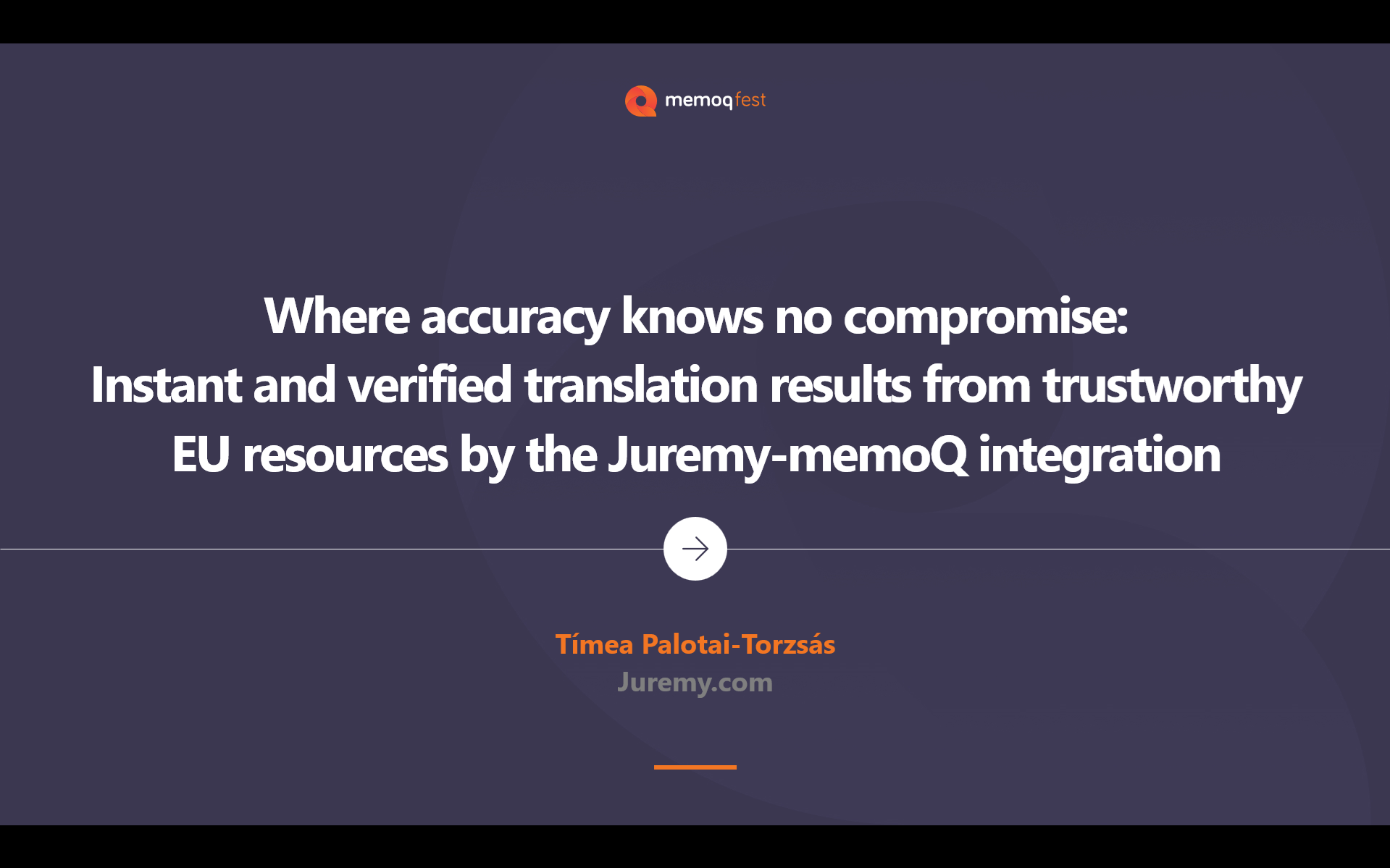

AI-based MT is young, but tags never get old
In the beginning was the word, but very soon afterwards a pesky thing called markup showed up. We’ve all seen codes in running text that don’t mean themselves: the start of some formatting, or a placeholder for a changing value that software will substitute at runtime. Finally, localization engineers showed up and decided it was a good idea to turn perfectly normal text into markup too, for instance to prevent brand names from getting accidentally “translated.”
Machine translation models, however, have always been ovewhelmingly trained on plain text. Markup was an afterthought, something to insert in the right places after translation proper. Markup that represents content, like those regex-tagged brand names, were a complication that needed special processing.
With the appearance of AI translators, we see this shifting. The training data of these models includes a lot of computer code, which makes them unexpectedly good at dealing with XML tags and other markup in text.
In this session I’ll look at how MT systems deal with tags under the hood, and how some of the practices refined in the age of statistical and neural MT may no longer be optimal when AI translators are involved.
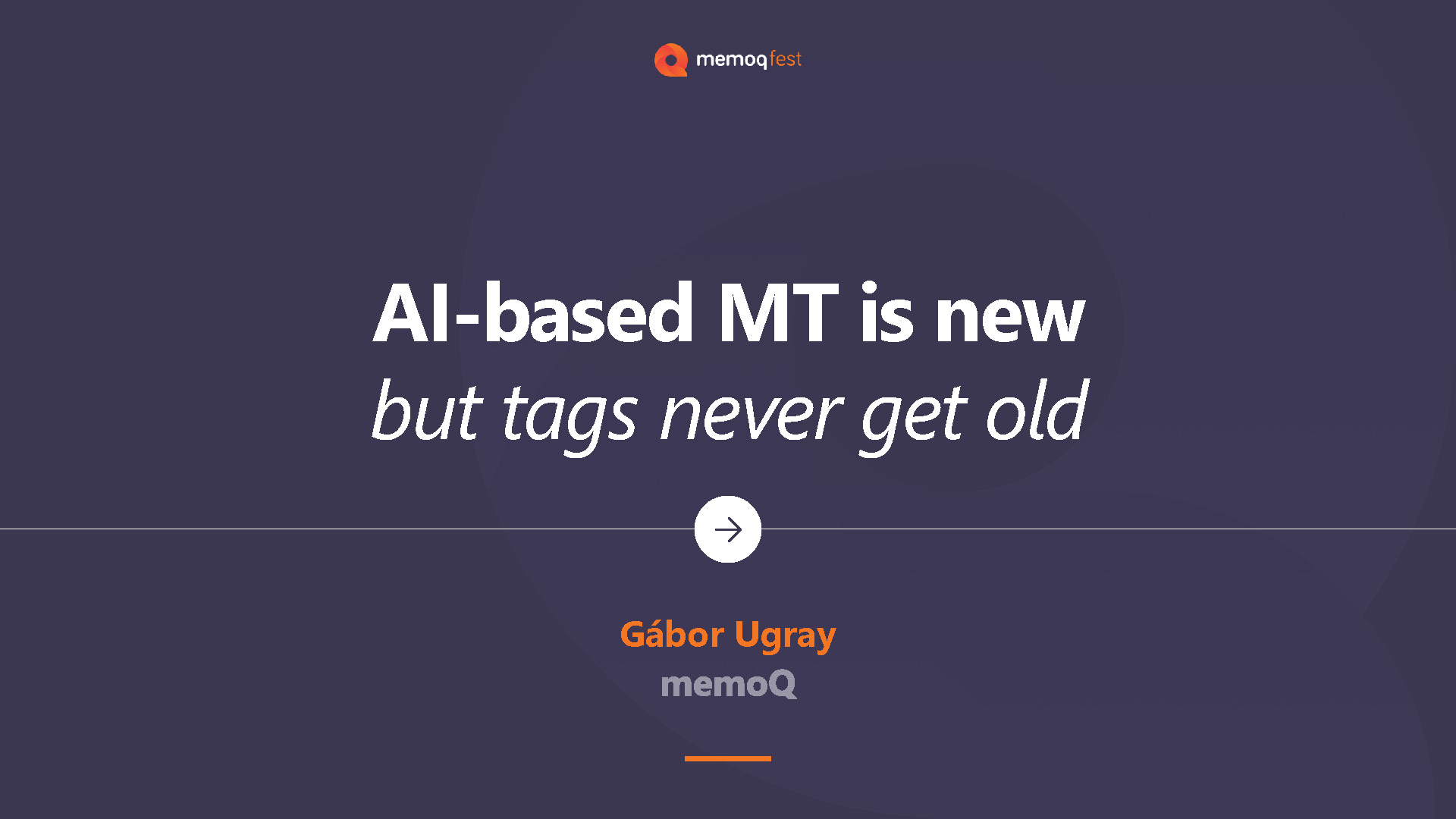

XML made easy
XML files may look scary, but they are following standardized rules and memoQ can handle them very well. Most of the various XML formats can be imported seamlessly with just several clicks, and more complex varieties require just some more tinkering with the filter setting. This presentation will cover the basics: how to handle different XML file types and their peculiarities, with some advanced tips on how to approach these extremely complex XML documents with embedded content.
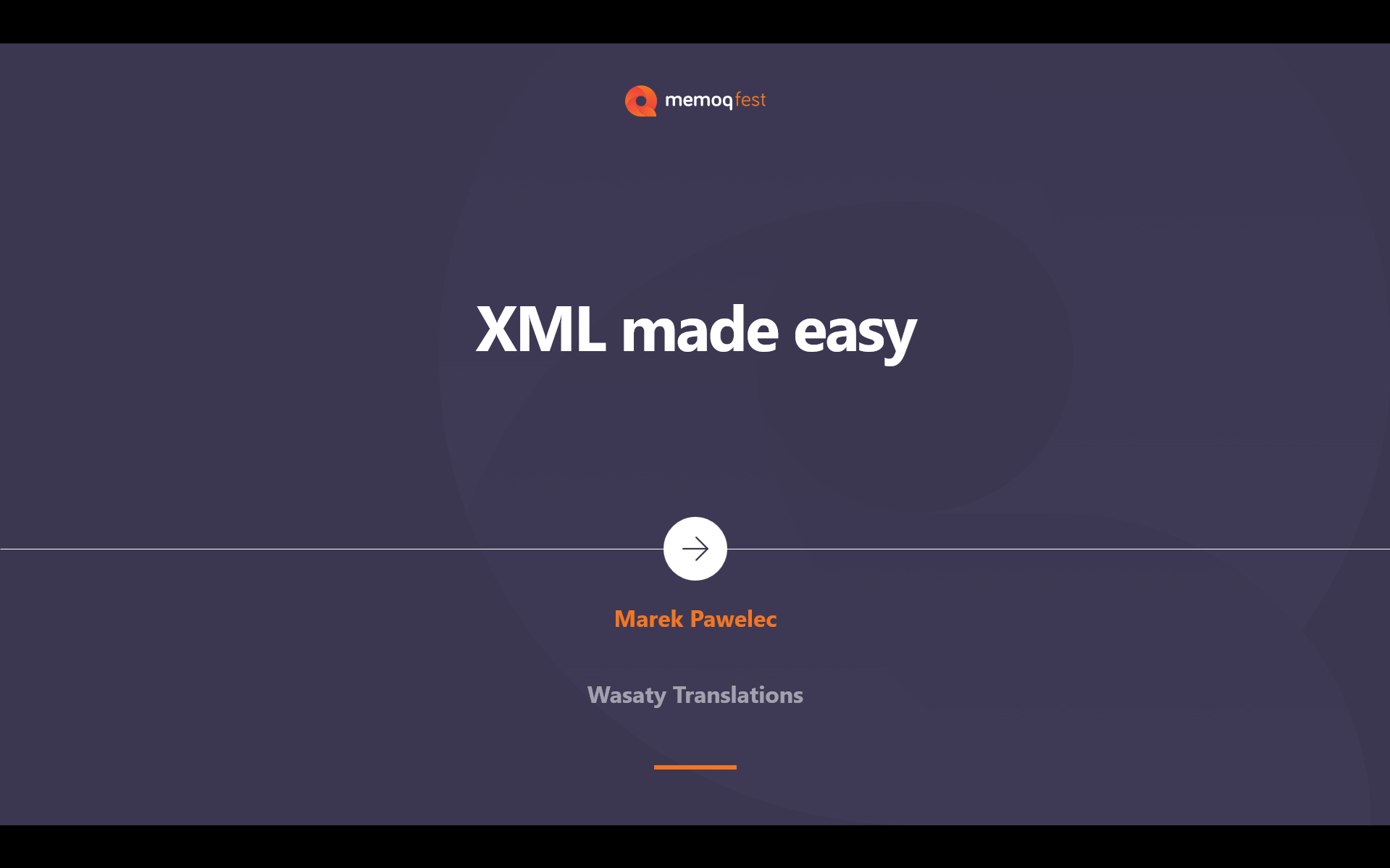

PM @ LSP = (IT + DTP + CAT + SALES + AI + #skills#) x {2,}
I don’t remember the last session that covered what a Project Manager working in a LSP means, or should mean/do… (admittedly, I didn’t participate in many sessions along the years, skipped many… shhh!).
So, my proposal will try and paint a picture of MY idea of what a Project Manager in a translation company should look like (and if it’s really feasible).
- Will try to match each part (or most of them) of the body to a feature, functionality, something from memoQ.
- Will add some AI into the mix since it’s still the go to acronym…
- By the end of the session, I will have created a monstrosity of skills, mashed up into one entity.
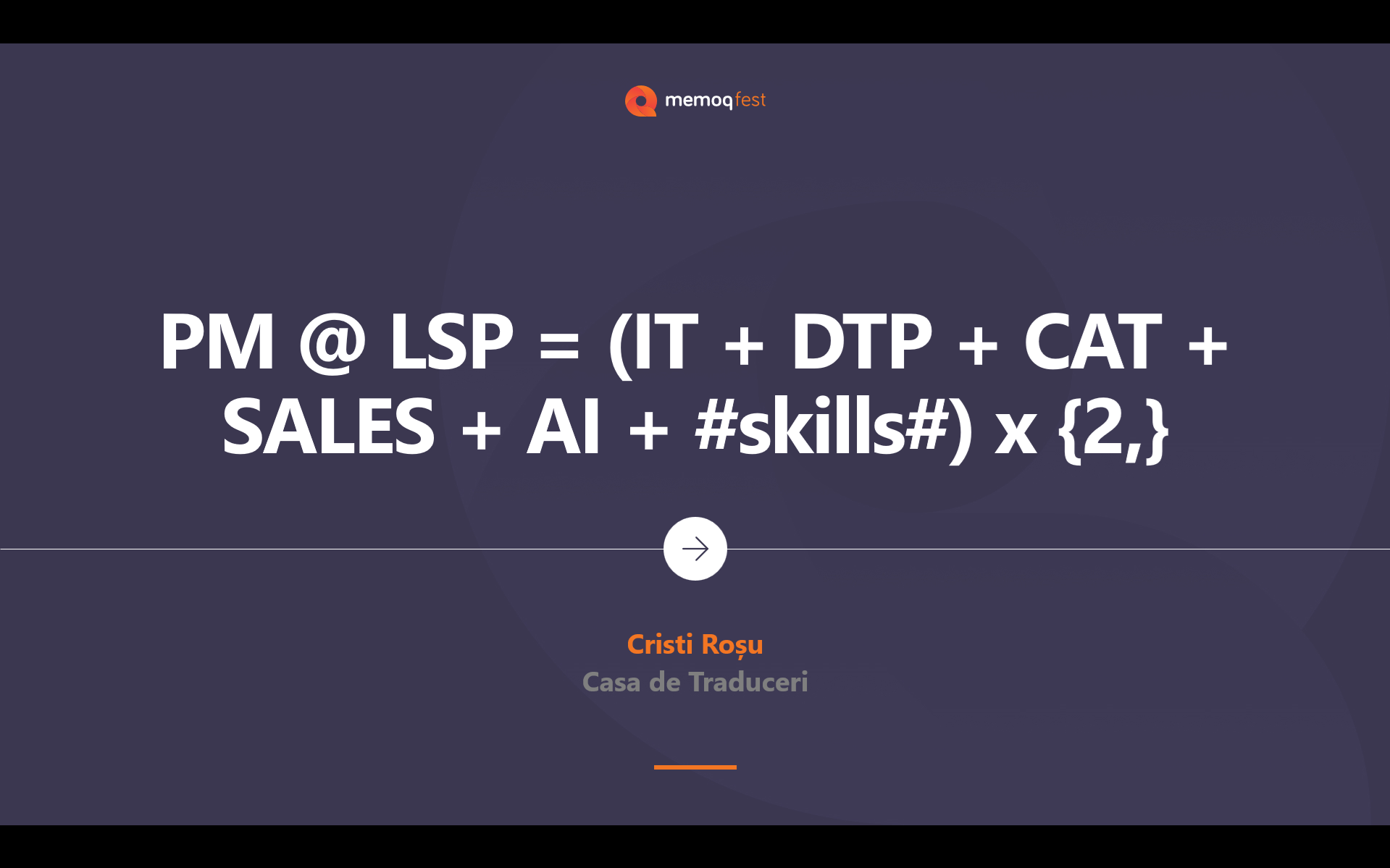

What's AI got to do with it? Enhancing client satisfaction through human value combined with workflow automation solutions
Now, more than ever before, it has become increasingly difficult to stay relevant and competitive in our line of work. Although the buzzwords of the day such as LLMs, AI-driven solutions and machine learning seem to be the main selling points when it comes to client attraction and retention, I believe that the human touch still plays a much more important role than we give it credit for. This presentation highlights the crucial role we humans, i.e. project managers or “superhumans” play in daily interactions with our clients – how our expertise, combined with the best aspects of what technological advancements have to offer, can help nurture these relationships and deliver added value. Through a case study I will demonstrate how Ciklopea introduced an automated handoff process for one of our key clients through the use of memoQ’s Sharepoint connector, what impacts it has had on our workflow and how it influenced our relationship with the client.
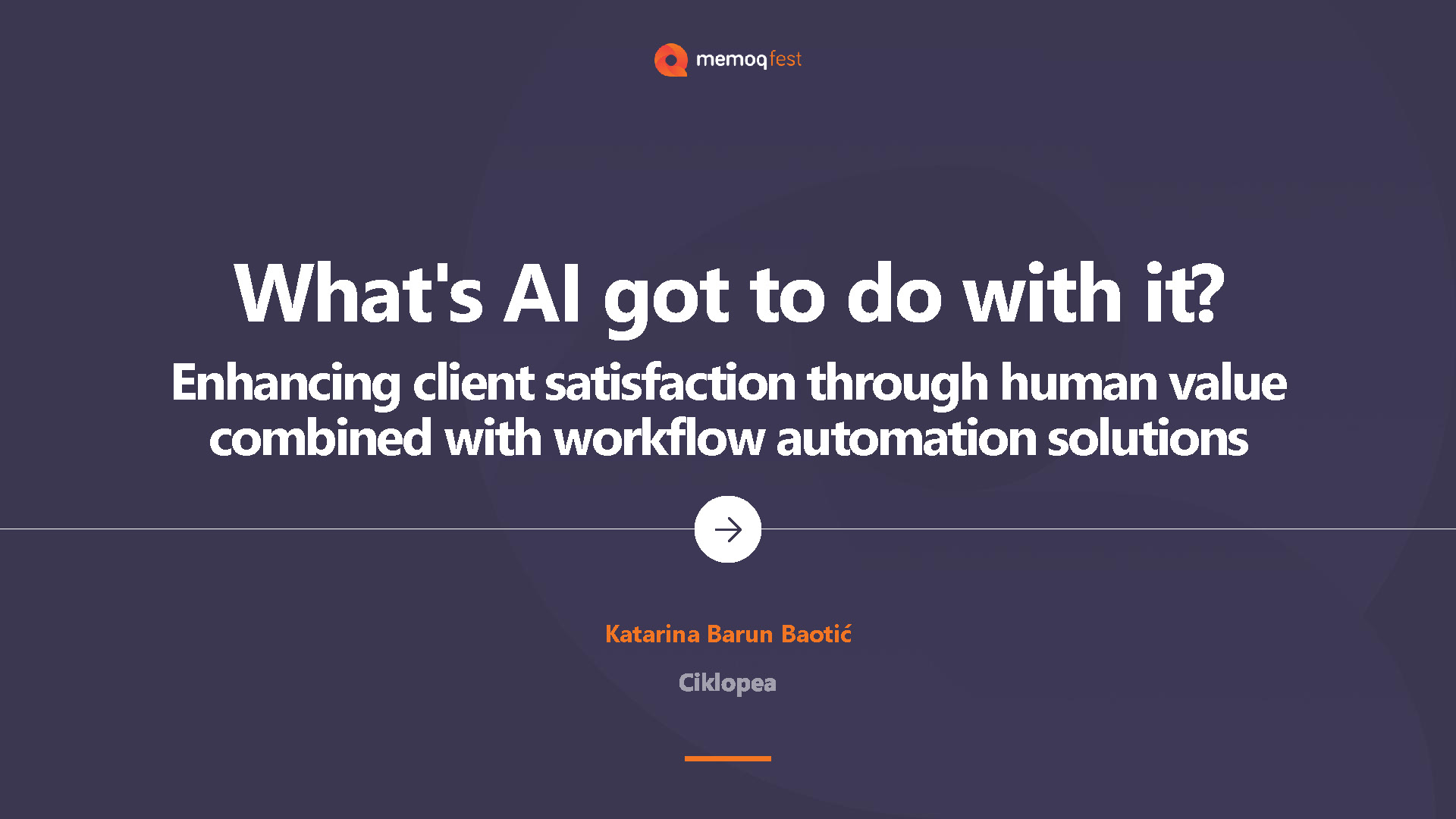
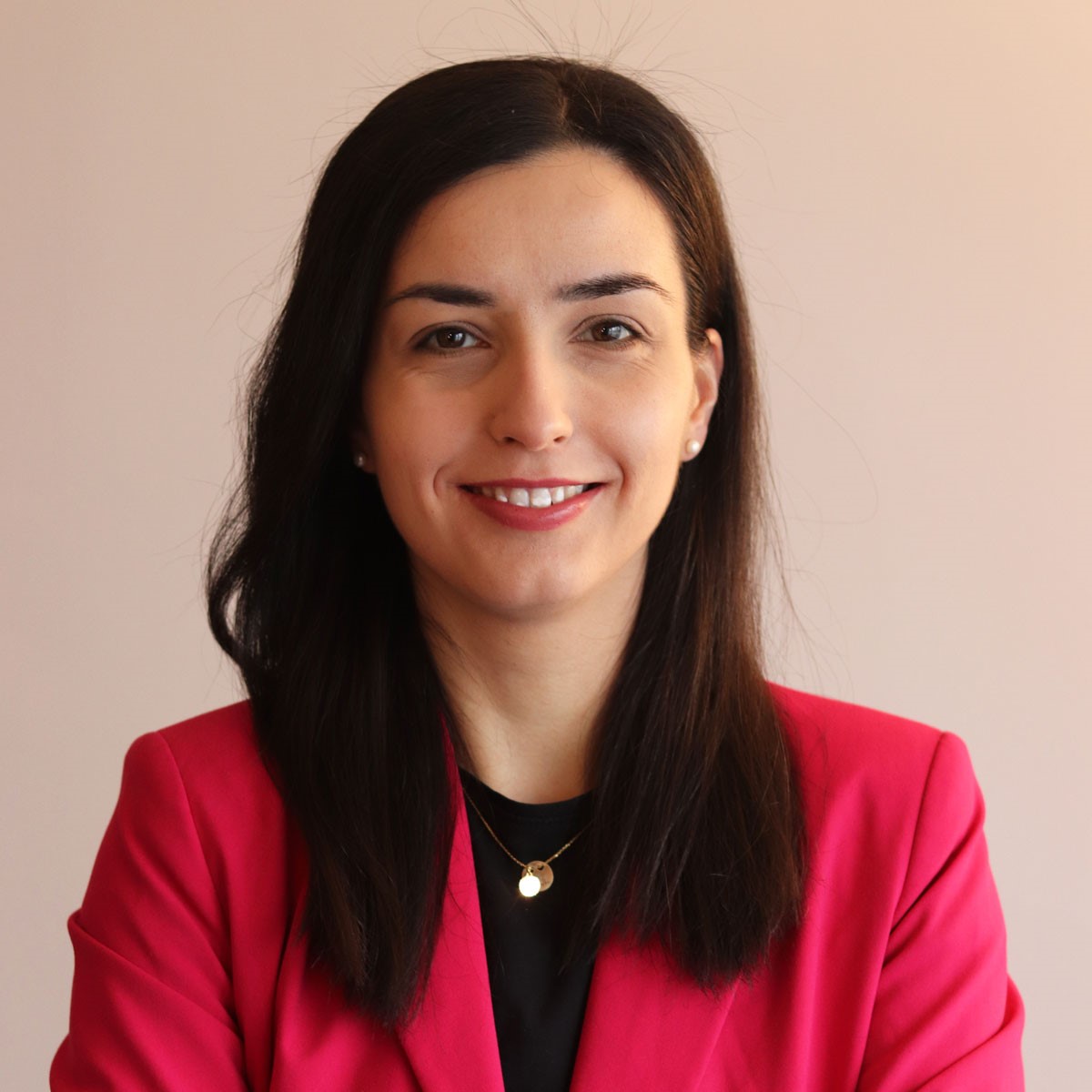
From Raw Machine Content to Refined Translations: Human-AI Synergy in Multilingual Content Production
In the evolving landscape of multilingual content, speed and quality no longer have to be at odds. This presentation explores a cutting-edge workflow where AI and human expertise work hand-in-hand to transform raw machine translations into polished, high-quality content. By leveraging frequency analysis, LLM-powered glossary creation, and AI-driven quality scoring, we streamline the translation process without sacrificing nuance or accuracy. Learn how targeted human intervention—guided by AI insights—maximizes both efficiency and impact, delivering faster time-to-market and smarter resource allocation for content-conscious and budget-minded clients alike.
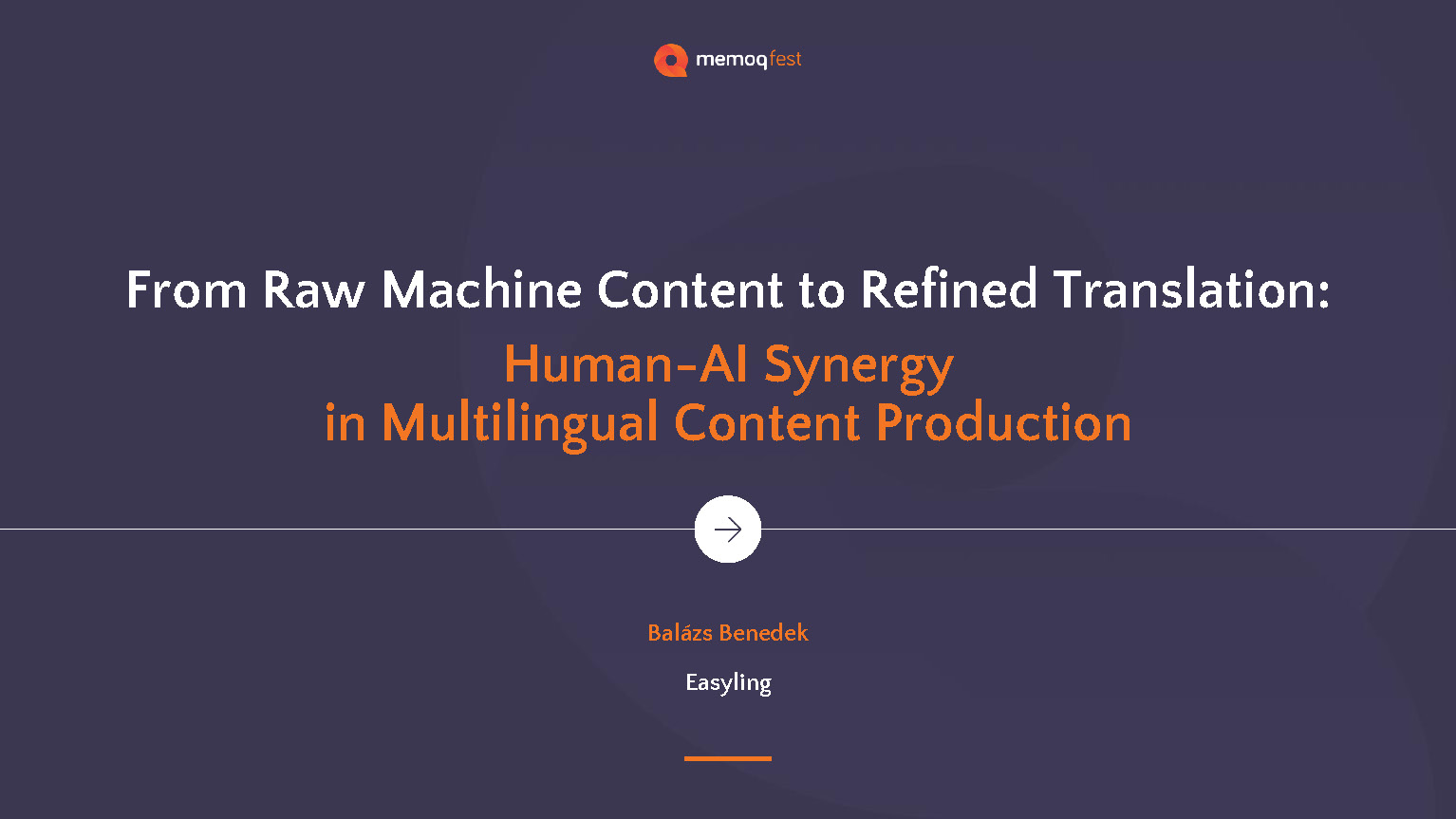

A new workflow benefiting from memoQ and prompting to have better machine translations
Learn about the innovative combination of memoQ and AI prompting that helps improve machine translation (MT) quality and ease project management. This presentation introduces a new AI-assisted workflow designed to enhance terminology consistency, reduce manual work, and optimize translation quality. By leveraging memoQ’s project automation and AI-driven terminology and style adaptation, this workflow ensures faster, more accurate translations while maintaining a structured quality assurance (QA) process. Join us to see how memoQ, AI prompting, and human post-editing work together for efficient, high-quality translations!
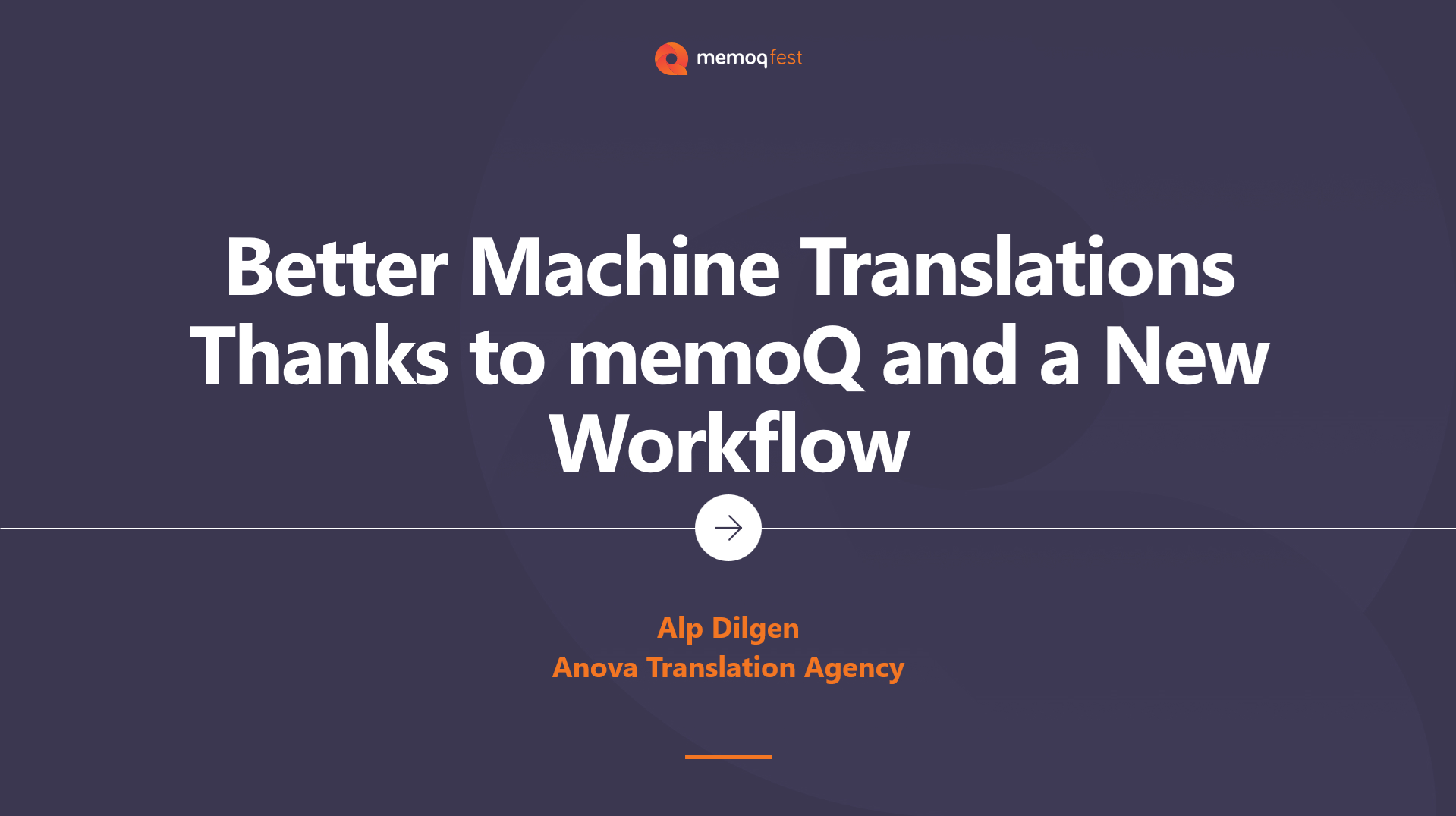

Lunch & Networking
memoQ master class: Regex 101
Regular expressions are a powerful tool that facilitates working with text in the context of translation and localization, allowing you to perform many tasks that would otherwise be impossible (e.g., importing non-standard files) or significantly speed up and simplify numerous activities (e.g., quality control, filtering, conversion, etc.). However, regular expressions have a relatively high entry barrier which discourages many people from using them. In memoQ, however, you can take advantage of many solutions provided with the program, and that is what this presentation will be about: how and for what to use regular expressions available in memoQ, learning basics along the way.
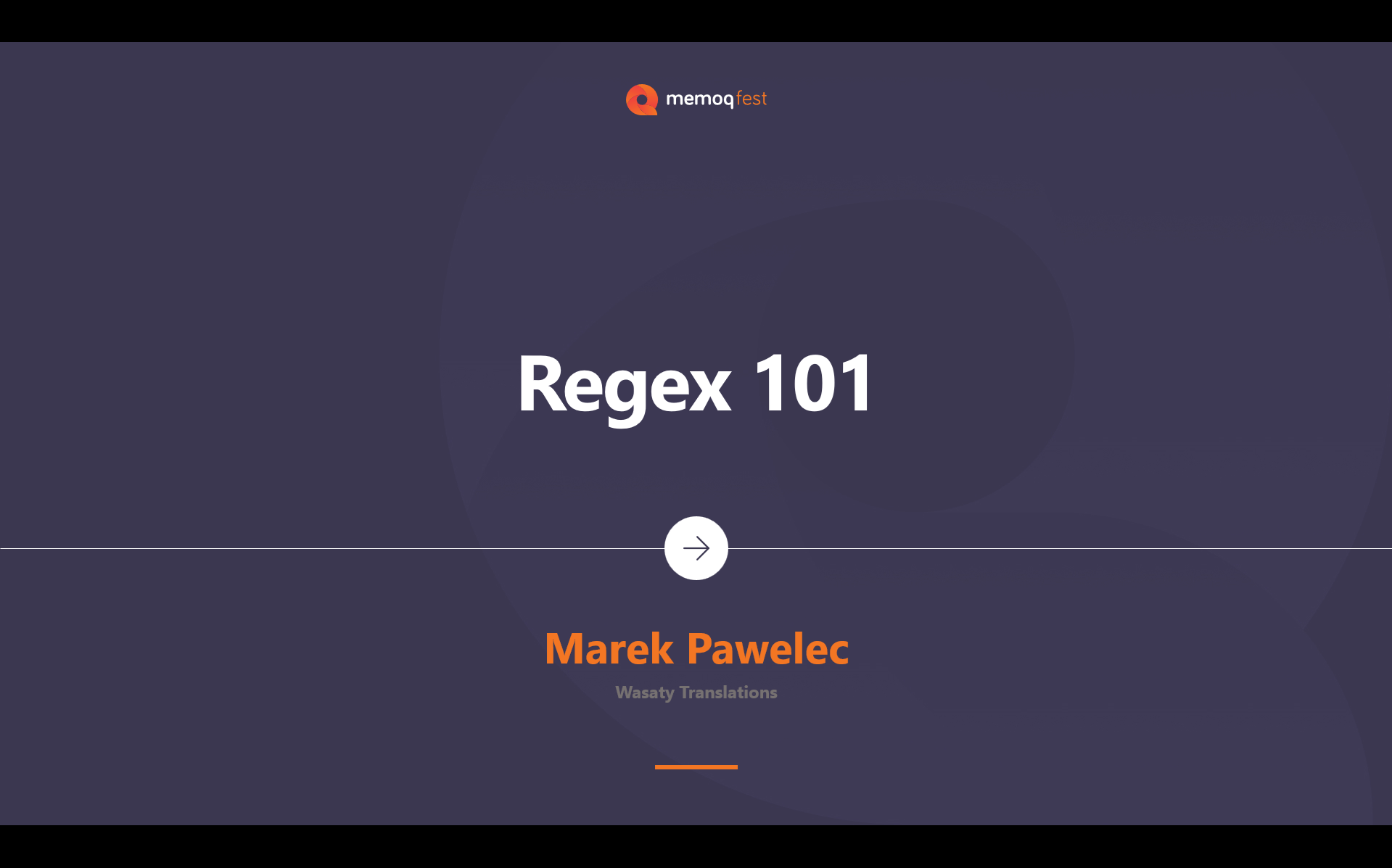

memoQ master class: How to fight a Hydra. Creating integrations with memoQ – thinking process, examples and practical demo.
If you ever wondered how to create an integration with memoQ or wanted to understand how certain integrations work – look no further. memoQ Business Services Team will take you through the process and will discuss the elements of a practical implementation and will even demo a proof of concept of an integration with LGS by Lots-of-dots.
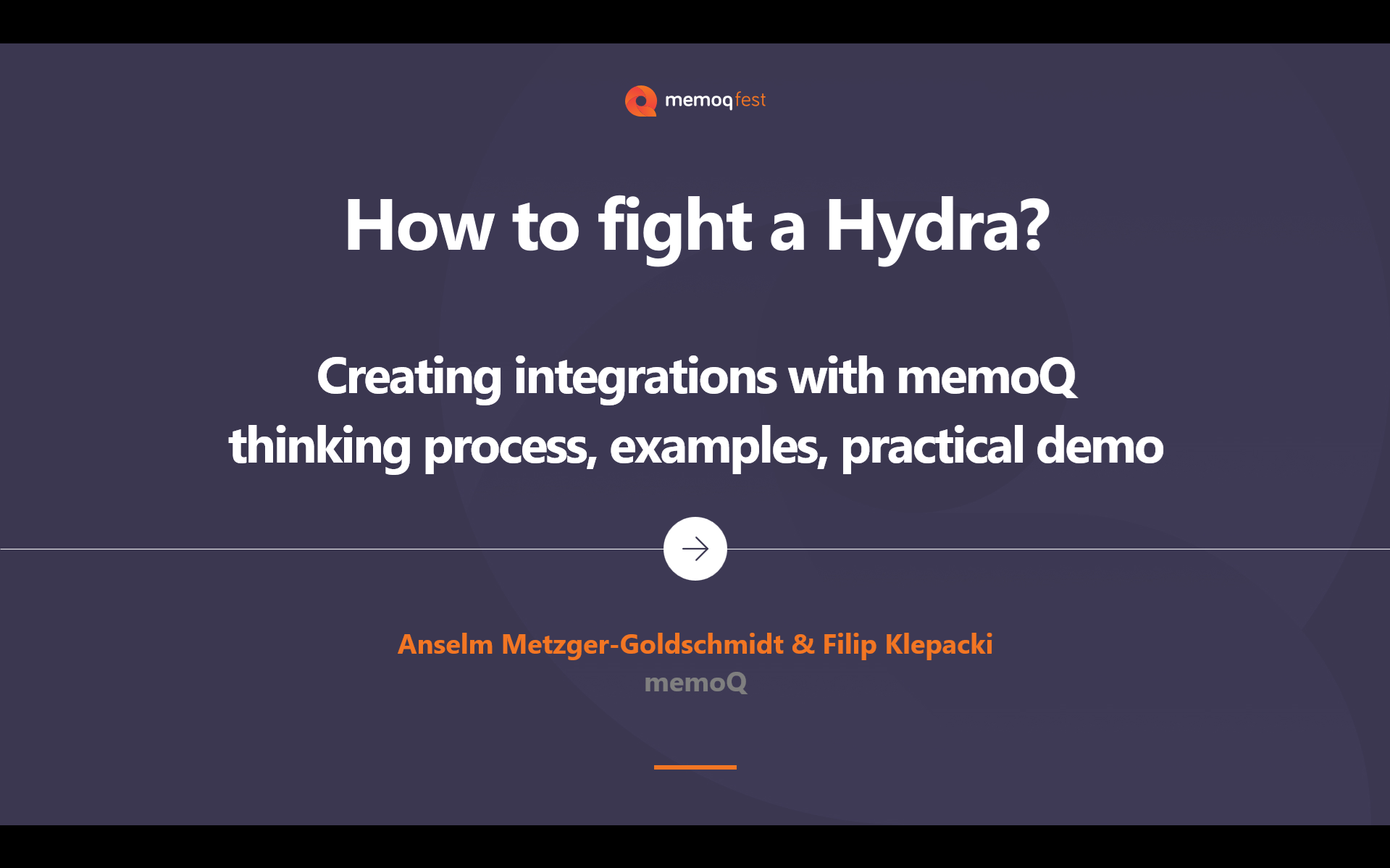


memoQ master class: Unlocking the power of LiveDocs
Join us for this hands-on master class to explore LiveDocs — one of the core and most loved components of memoQ. Discover how LiveDocs serves as a powerful foundation for enhancing translation quality and unlocking the full potential of memoQ’s AI-driven features.
In this session, you’ll learn:
- The core concept and fundamentals of LiveDocs
- How to efficiently work with monolingual and bilingual files
- How to customize settings and apply filters
- Upcoming developments and enhancements in LiveDocs
- How LiveDocs can improve the use of memoQ AGT and globalese by memoQ
Level: Beginner to intermediate
Target audience: translators and project managers
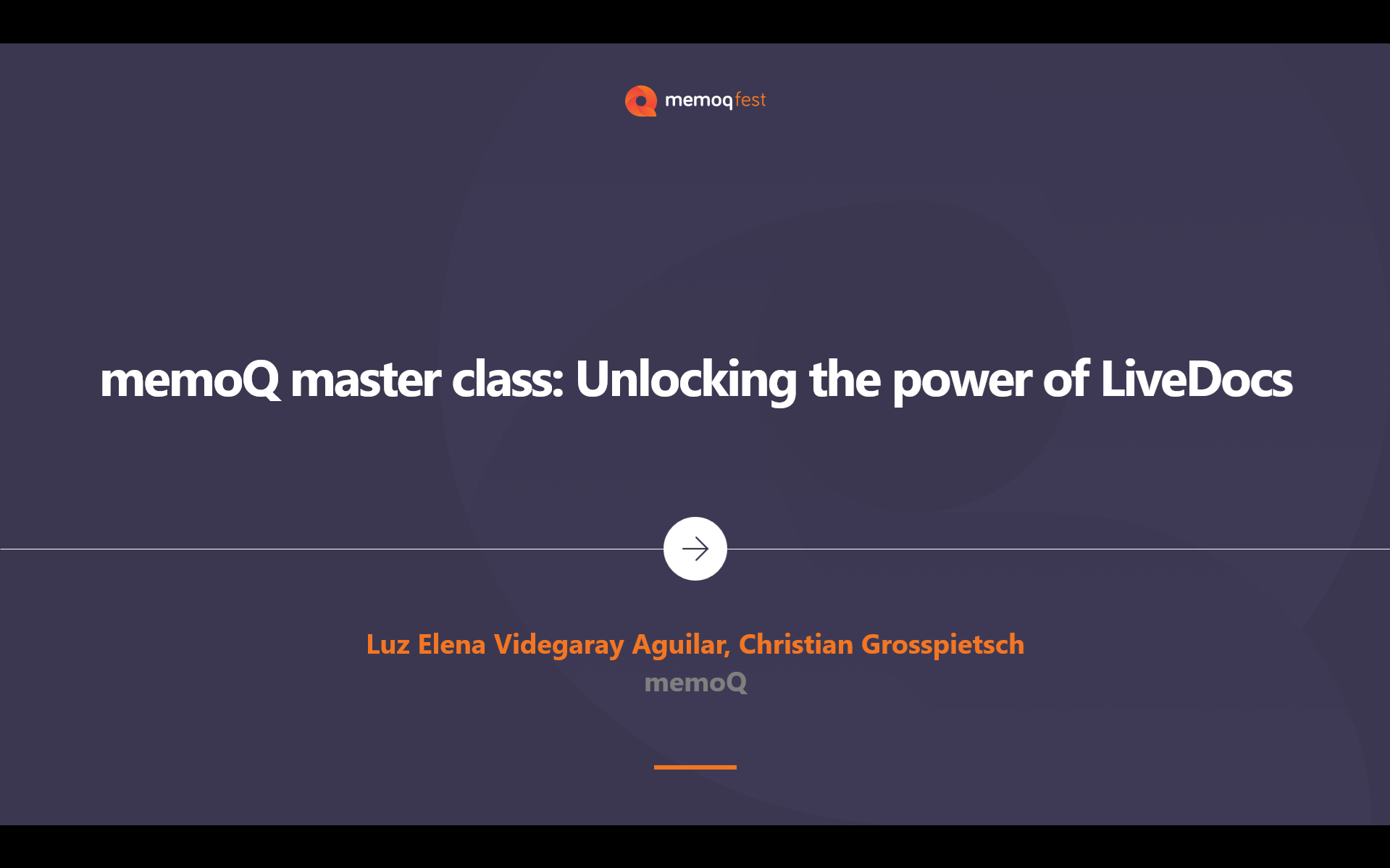


Coffee Break
Closing Panel Discussion
Agnes Varga, memoQ CTO, Gábor Bessenyei, Product manager at memoQ and founder of globalese, and Peter Reynolds, memoQ CEO will discuss memoQ’s future plans. The Panel which will be chaired by Eddie Arrieta, publisher of Multilingual magazine, will also look at what makes memoQ special and how we believe memoQ will develop and what are the issues which we have to deal with. There will be an opportunity for the audience to ask questions.
